#Purify faith to gain paradise
Text


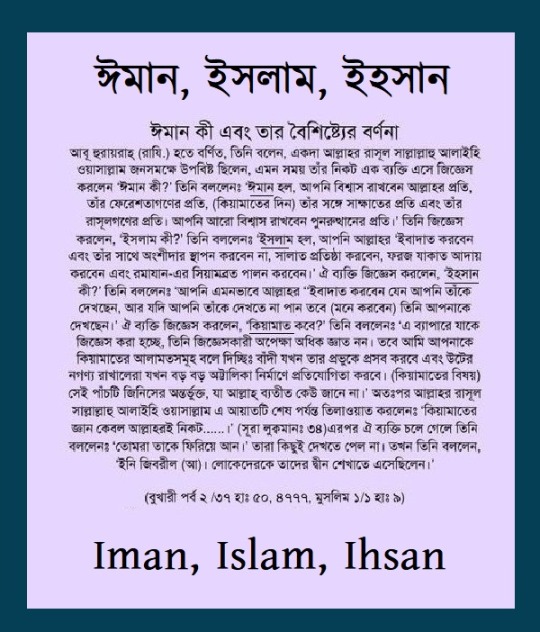






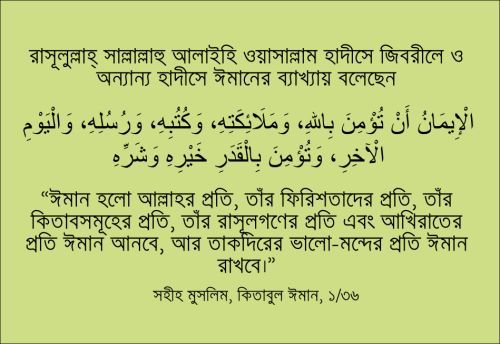






ঈমান-আকিদাহ
Iman-Aqidah
ঈমান শব্দটির আভিধানিক অর্থ হলো স্বীকৃতি দেওয়া, স্বীকার করা বা মেনে নেওয়া। অর্থাৎ কোন বিষয়ে বিশ্বাসের প্রকৃতি বা ধরনের নাম হলো আকীদা, আর কোন আকীদা বা বিশ্বাসকে স্বীকৃতি দেওয়া বা মেনে নেওয়ার নাম হলো তার উপর ঈমান আনা।
ঈমান কাকে বলে?
ঈমান (إِيمَان 'ঈমান', শাব্দিক অর্থ প্রচলিতমতে বিশ্বাস, মতান্তরে স্বীকৃতি)শব্দের আভিধানিক অর্থ স্বীকার করা, স্বীকৃতি দেওয়া, অনুগত হওয়া মতান্তরে দৃঢ় বিশ্বাস করা। এটি কুফর বা অস্বীকার করা বা অবাধ্যতার বিপরীত। ইসলাম ধর্মে ঈমানের অর্থ অত্যন্ত ব্যাপক।
ঈমানের রুকন কয়টি ও কি কি?
ঈমানের রুকন ৬টি। সেগুলি হচ্ছে, আল্লাহ্র প্রতি ঈমান, তাঁর ফেরেশতামণ্ডলীর প্রতি ঈমান, তাঁর কিতাবসমূহের প্রতি ঈমান, তাঁর রাসূলগণের প্রতি ঈমান, আখেরাতের প্রতি ঈমান এবং তাক্বদীরের ভাল-মন্দের প্রতি ঈমান। কুরআনুল কারীম এবং সহীহ হাদীসের বক্তব্য অনুযায়ী উক্ত রুকনসমূহের প্রত্যেকটির প্রতি ঈমান না আনা পর্যন্ত কারো ঈমান পূর্ণ হবে না। যে ব্যক্তি এগুলির কোনো একটিকে অস্বীকার করবে, সে ঈমানের গণ্ডি থেকে বের হয়ে যাবে।
“রাসূলের নিকট তাঁর প্রতিপালকের পক্ষ থেকে যে অহি অবতীর্ণ হয়েছে, তাকে তিনি এবং মুমিনগণ মনেপ্রাণে বিশ্বাস করেছেন। তাঁরা সবাই ঈমান এনেছেন আল্লাহ্র প্রতি, তাঁর ফেরেশতামণ্ডলীর প্রতি, তাঁর কিতাবসমূহের প্রতি এবং তাঁর রাসূলগণের প্রতি। (তাঁরা বলে,) আমরা তাঁর রাসূলগণের মধ্যে কোন তারতম্য করি না। তাঁরা বলে, আমরা শুনেছি এবং মেনে নিয়েছি। হে আমাদের পালনকর্তা! আমরা আপনার কাছে ক্ষমা চাই এবং আপনারই নিকট প্রত্যাবর্তন করতে হবে” (বাক্বারাহ ২৮৫
ঈমানের মৌলিক ৬ স্তম্ভ
The basic 6 pillars of faith
ঈমান ঠিক না করে জীবনভর নেক আমল করলেও আখেরাতে কোনো লাভ হবে না। জিবরাঈল (আ.) আল্লাহর পক্ষ থেকে ছদ্মবেশে এসে রাসুলুল্লাহ (সা.) কে জিজ্ঞাসা করলেন, ঈমান কাকে বলে? জবাবে রাসুলুল্লাহ (সা.) বললেন, ‘ঈমানের হাকিকত বা স্বরূপ হলো, তুমি বদ্ধমূলভাবে বিশ্বাস স্থাপন করবে আল্লাহ তায়ালার প্রতি, তাঁর ফেরেশতাদের প্রতি, আসমানি কিতাবগুলোর প্রতি, আল্লাহর নবী-রাসুলদের প্রতি, কেয়ামত দিবসের প্রতি এবং তকদিরের ভালো-মন্দ সবকিছুই আল্লাহর পক্ষ থেকে নির্ধারিত হওয়ার প্রতি।’ (বোখারি : ৫০)। উল্লিখিত হাদিসটি ‘ঈমানে মুফাসসাল’ এর ভিত্তি। ঈমানে মুফাসসালে ঘোষণা করা হয়, আমি ঈমান আনলাম, ১. আল্লাহ তায়ালার প্রতি, ২. তাঁর ফেরেশতাদের প্রতি, ৩. তাঁর কিতাবগুলোর প্রতি, ৪. তাঁর নবী-রাসুলদের প্রতি, ৫. কেয়ামত দিবসের প্রতি, ৬. ভালো-মন্দ তকদিরের প্রতি
ঈ- ঈমান বিশুদ্ধ করে হবো ধন্য
ঈমান ছাড়া জান্নাত নাই
যারা মুসলিম তারাই জান্নাতে যাবে
youtube
ঈমান ছাড়া জান্নাত নাই
0:04 / 0:39
ঈমান কাকে বলে? || ঈমান ছাড়া জান্নাত নাই
youtube
ঈমানের সংরক্ষণ -
youtube
ঈ- ঈমান বিশুদ্ধ করে হবো ধন্য
ঈমান ছাড়া জান্নাত নাই
There is no paradise without faith
ঈমান-আকিদাহ
#ঈমান#ঈ- ঈমান বিশুদ্ধ করে হবো ধন্য#ঈমান ছাড়া জান্নাত নাই#There is no paradise without faith#ঈমান-আকিদাহ#Iman-#Aqidah#Iman-Aqidah#ঈ#ঈদ#E#Eiman#I will be blessed by purifying faith#Iman#Eid#ঈমানেররোকন#ঈমান বিশুদ্ধ করি জান্নাত লাভের জনা#Purify faith to gain paradise
0 notes
Text

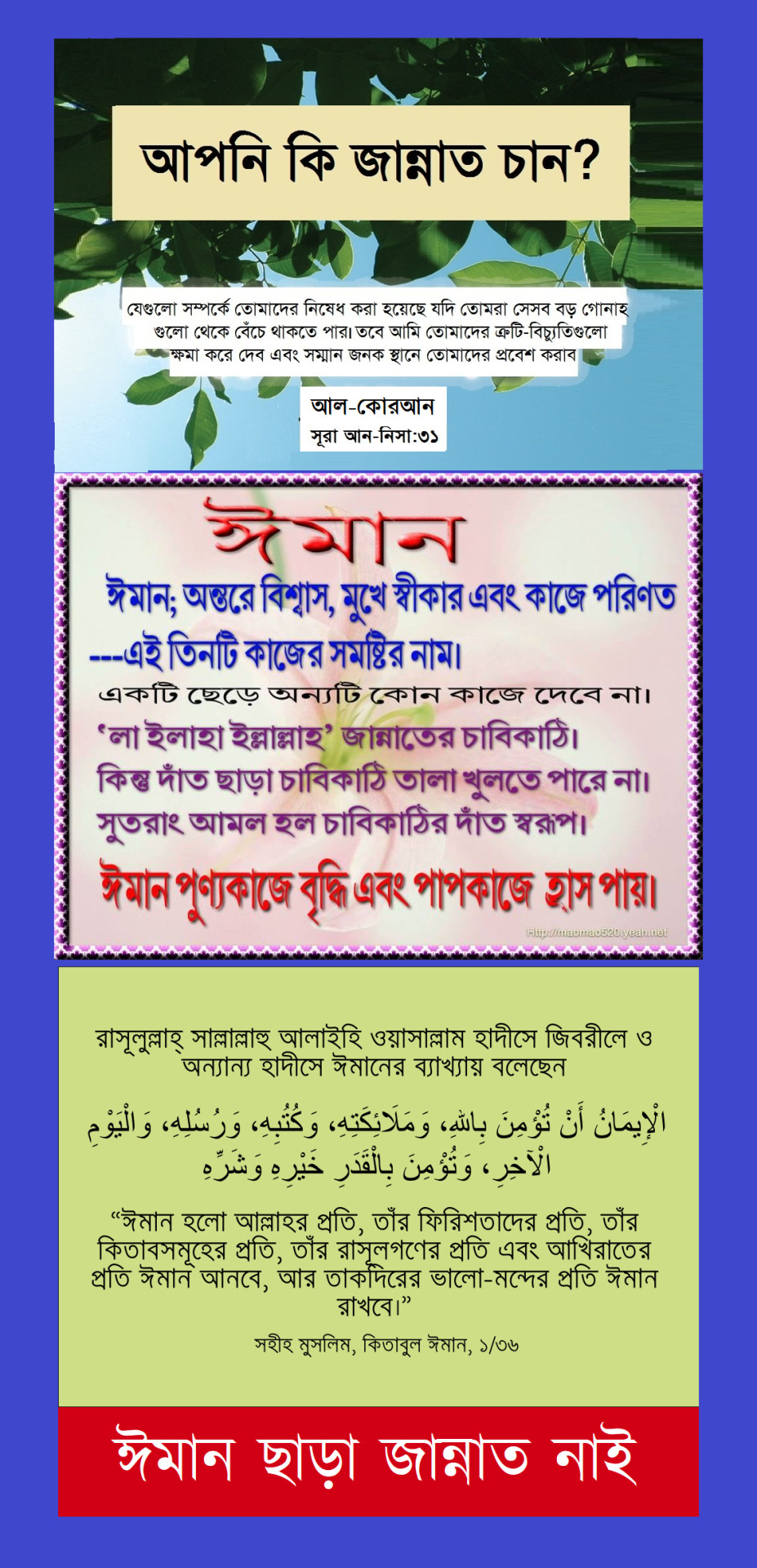
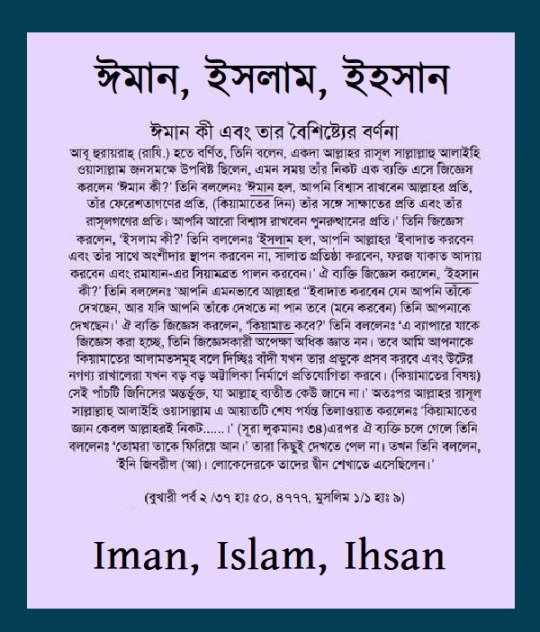



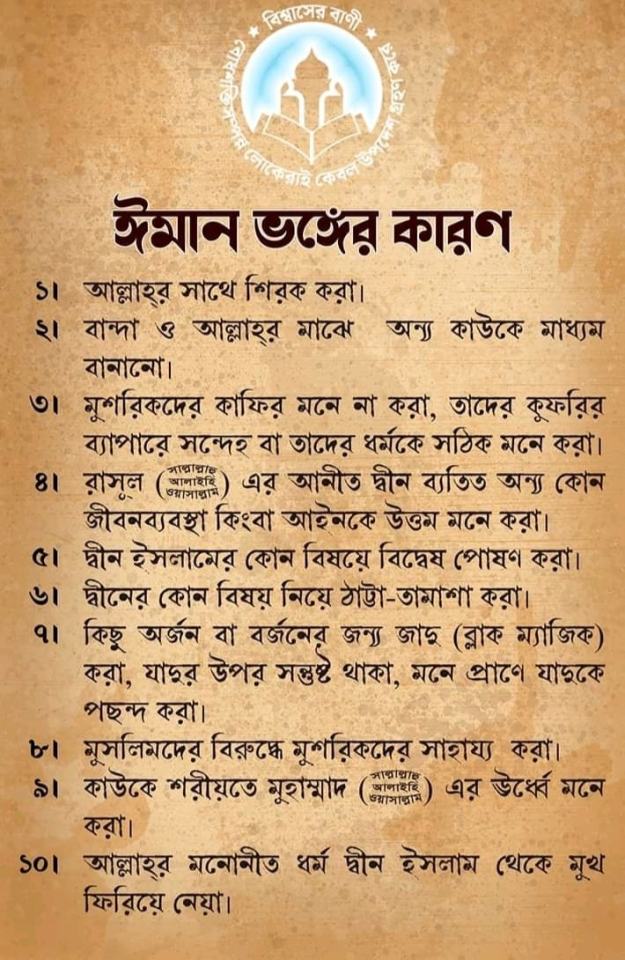
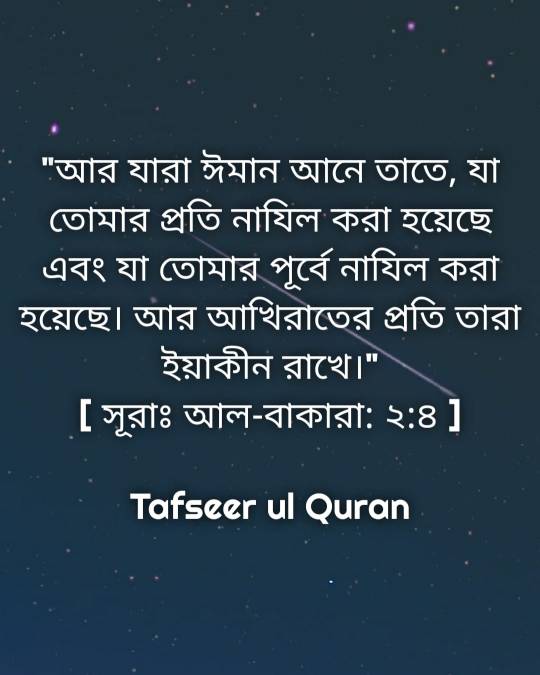
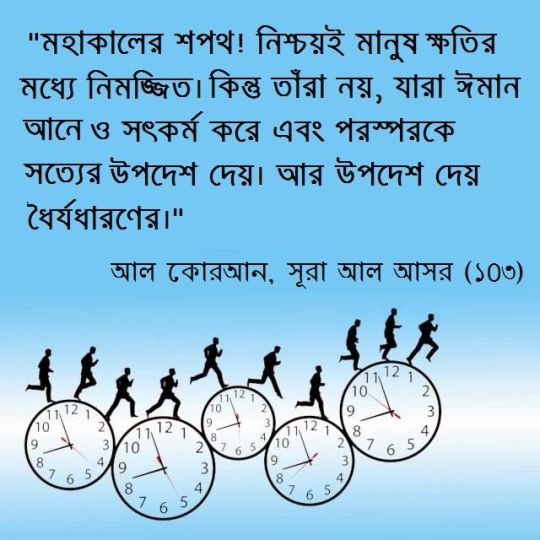
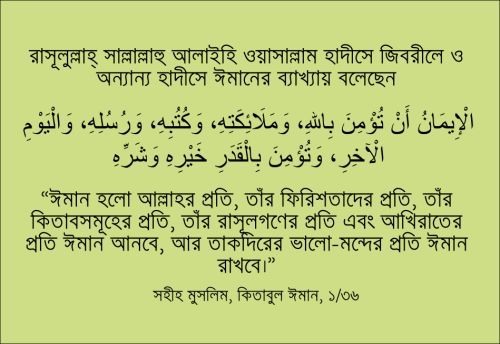




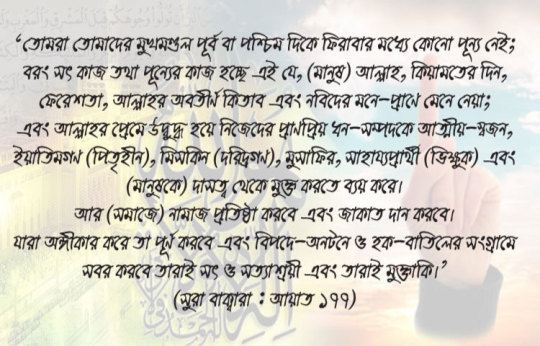

ঈমান-আকিদাহ
Iman-Aqidah
ঈমান শব্দটির আভিধানিক অর্থ হলো স্বীকৃতি দেওয়া, স্বীকার করা বা মেনে নেওয়া। অর্থাৎ কোন বিষয়ে বিশ্বাসের প্রকৃতি বা ধরনের নাম হলো আকীদা, আর কোন আকীদা বা বিশ্বাসকে স্বীকৃতি দেওয়া বা মেনে নেওয়ার নাম হলো তার উপর ঈমান আনা।
ঈমান কাকে বলে?
ঈমান (إِيمَان 'ঈমান', শাব্দিক অর্থ প্রচলিতমতে বিশ্বাস, মতান্তরে স্বীকৃতি)শব্দের আভিধানিক অর্থ স্বীকার করা, স্বীকৃতি দেওয়া, অনুগত হওয়া মতান্তরে দৃঢ় বিশ্বাস করা। এটি কুফর বা অস্বীকার করা বা অবাধ্যতার বিপরীত। ইসলাম ধর্মে ঈমানের অর্থ অত্যন্ত ব্যাপক।
ঈমানের রুকন কয়টি ও কি কি?
ঈমানের রুকন ৬টি। সেগুলি হচ্ছে, আল্লাহ্র প্রতি ঈমান, তাঁর ফেরেশতামণ্ডলীর প্রতি ঈমান, তাঁর কিতাবসমূহের প্রতি ঈমান, তাঁর রাসূলগণের প্রতি ঈমান, আখেরাতের প্রতি ঈমান এবং তাক্বদীরের ভাল-মন্দের প্রতি ঈমান। কুরআনুল কারীম এবং সহীহ হাদীসের বক্তব্য অনুযায়ী উক্ত রুকনসমূহের প্রত্যেকটির প্রতি ঈমান না আনা পর্যন্ত কারো ঈমান পূর্ণ হবে না। যে ব্যক্তি এগুলির কোনো একটিকে অস্বীকার করবে, সে ঈমানের গণ্ডি থেকে বের হয়ে যাবে।
“রাসূলের নিকট তাঁর প্রতিপালকের পক্ষ থেকে যে অহি অবতীর্ণ হয়েছে, তাকে তিনি এবং মুমিনগণ মনেপ্রাণে বিশ্বাস করেছেন। তাঁরা সবাই ঈমান এনেছেন আল্লাহ্র প্রতি, তাঁর ফেরেশতামণ্ডলীর প্রতি, তাঁর কিতাবসমূহের প্রতি এবং তাঁর রাসূলগণের প্রতি। (তাঁরা বলে,) আমরা তাঁর রাসূলগণের মধ্যে কোন তারতম্য করি না। তাঁরা বলে, আমরা শুনেছি এবং মেনে নিয়েছি। হে আমাদের পালনকর্তা! আমরা আপনার কাছে ক্ষমা চাই এবং আপনারই নিকট প্রত্যাবর্তন করতে হবে” (বাক্বারাহ ২৮৫
ঈমানের মৌলিক ৬ স্তম্ভ
The basic 6 pillars of faith
ঈমান ঠিক না করে জীবনভর নেক আমল করলেও আখেরাতে কোনো লাভ হবে না। জিবরাঈল (আ.) আল্লাহর পক্ষ থেকে ছদ্মবেশে এসে রাসুলুল্লাহ (সা.) কে জিজ্ঞাসা করলেন, ঈমান কাকে বলে? জবাবে রাসুলুল্লাহ (সা.) বললেন, ‘ঈমানের হাকিকত বা স্বরূপ হলো, তুমি বদ্ধমূলভাবে বিশ্বাস স্থাপন করবে আল্লাহ তায়ালার প্রতি, তাঁর ফেরেশতাদের প্রতি, আসমানি কিতাবগুলোর প্রতি, আল্লাহর নবী-রাসুলদের প্রতি, কেয়ামত দিবসের প্রতি এবং তকদিরের ভালো-মন্দ সবকিছুই আল্লাহর পক্ষ থেকে নির্ধারিত হওয়ার প্রতি।’ (বোখারি : ৫০)। উল্লিখিত হাদিসটি ‘ঈমানে মুফাসসাল’ এর ভিত্তি। ঈমানে মুফাসসালে ঘোষণা করা হয়, আমি ঈমান আনলাম, ১. আল্লাহ তায়ালার প্রতি, ২. তাঁর ফেরেশতাদের প্রতি, ৩. তাঁর কিতাবগুলোর প্রতি, ৪. তাঁর নবী-রাসুলদের প্রতি, ৫. কেয়ামত দিবসের প্রতি, ৬. ভালো-মন্দ তকদিরের প্রতি
ঈ- ঈমান বিশুদ্ধ করে হবো ধন্য
ঈমান ছাড়া জান্নাত নাই
যারা মুসলিম তারাই জান্নাতে যাবে
youtube
ঈমান ছাড়া জান্নাত নাই
0:04 / 0:39
ঈমান কাকে বলে? || ঈমান ছাড়া জান্নাত নাই
youtube
ঈমানের সংরক্ষণ -
youtube
ঈ- ঈমান বিশুদ্ধ করে হবো ধন্য
ঈমান ছাড়া জান্নাত নাই
There is no paradise without faith
ঈমান-আকিদাহ
#ঈমান#Youtube#ঈ- ঈমান বিশুদ্ধ করে হবো ধন্য#ঈমান ছাড়া জান্নাত নাই#There is no paradise without faith#ঈমান-আকিদাহ#Iman-#Aqidah#Iman-Aqidah#ঈ#ঈদ#E#Eiman#I will be blessed by purifying faith#Iman#Eid#ঈমানেররোকন#ঈমান বিশুদ্ধ করি জান্নাত লাভের জনা#Purify faith to gain paradise
0 notes
Text

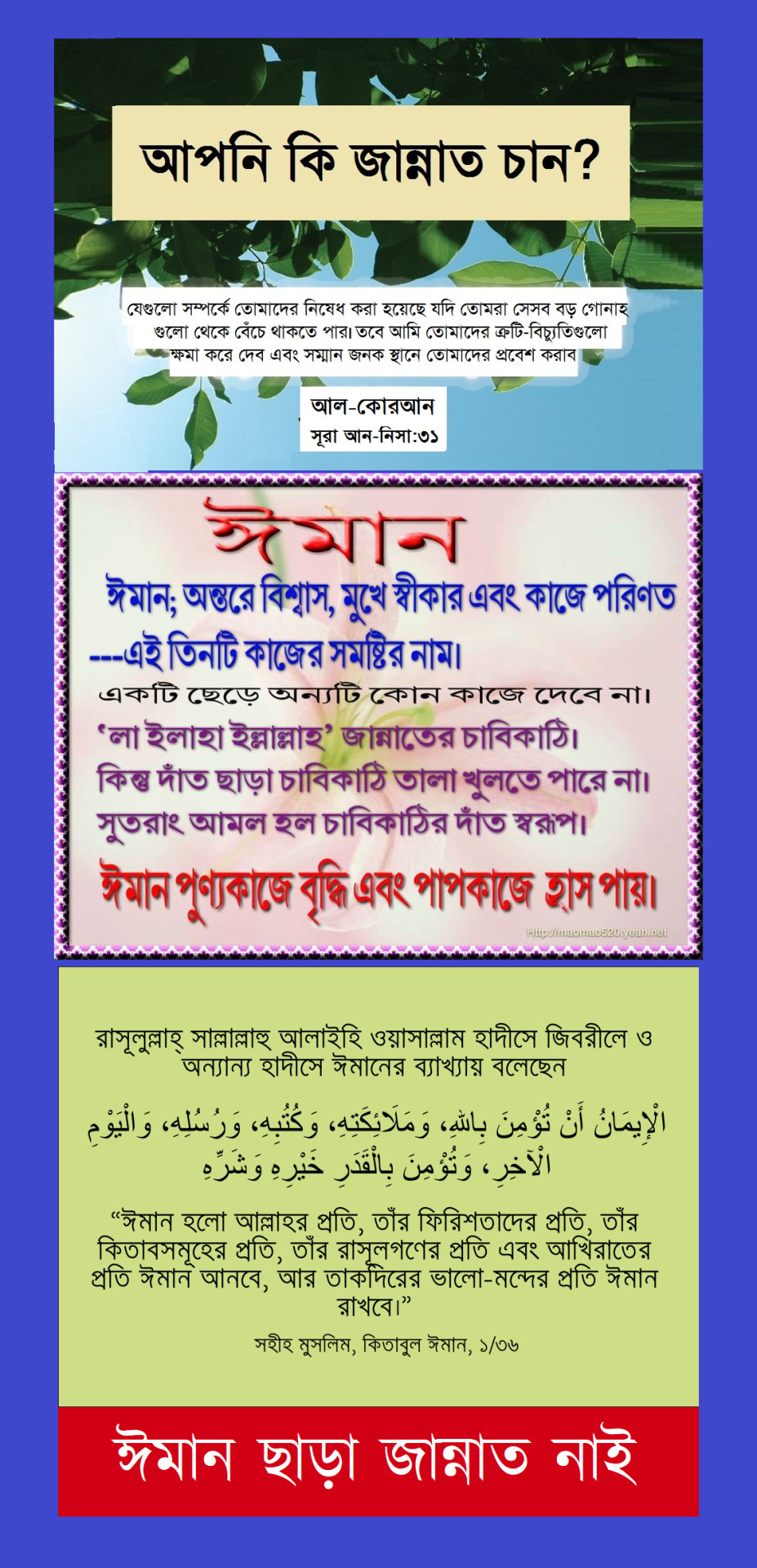






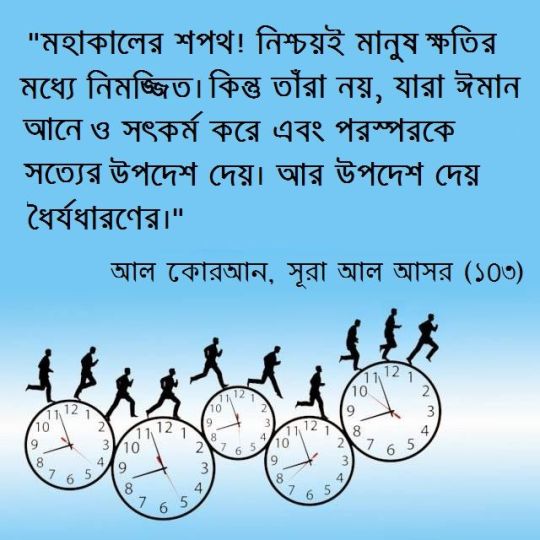
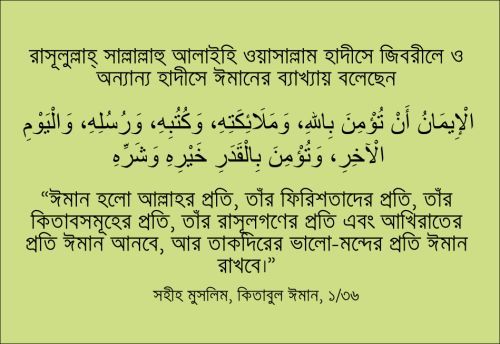




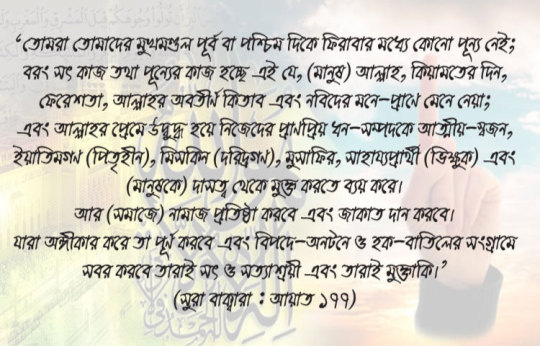

ঈমান-আকিদাহ
Iman-Aqidah
ঈমান শব্দটির আভিধানিক অর্থ হলো স্বীকৃতি দেওয়া, স্বীকার করা বা মেনে নেওয়া। অর্থাৎ কোন বিষয়ে বিশ্বাসের প্রকৃতি বা ধরনের নাম হলো আকীদা, আর কোন আকীদা বা বিশ্বাসকে স্বীকৃতি দেওয়া বা মেনে নেওয়ার নাম হলো তার উপর ঈমান আনা।
ঈমান কাকে বলে?
ঈমান (إِيمَان 'ঈমান', শাব্দিক অর্থ প্রচলিতমতে বিশ্বাস, মতান্তরে স্বীকৃতি)শব্দের আভিধানিক অর্থ স্বীকার করা, স্বীকৃতি দেওয়া, অনুগত হওয়া মতান্তরে দৃঢ় বিশ্বাস করা। এটি কুফর বা অস্বীকার করা বা অবাধ্যতার বিপরীত। ইসলাম ধর্মে ঈমানের অর্থ অত্যন্ত ব্যাপক।
ঈমানের রুকন কয়টি ও কি কি?
ঈমানের রুকন ৬টি। সেগুলি হচ্ছে, আল্লাহ্র প্রতি ঈমান, তাঁর ফেরেশতামণ্ডলীর প্রতি ঈমান, তাঁর কিতাবসমূহের প্রতি ঈমান, তাঁর রাসূলগণের প্রতি ঈমান, আখেরাতের প্রতি ঈমান এবং তাক্বদীরের ভাল-মন্দের প্রতি ঈমান। কুরআনুল কারীম এবং সহীহ হাদীসের বক্তব্য অনুযায়ী উক্ত রুকনসমূহের প্রত্যেকটির প্রতি ঈমান না আনা পর্যন্ত কারো ঈমান পূর্ণ হবে না। যে ব্যক্তি এগুলির কোনো একটিকে অস্বীকার করবে, সে ঈমানের গণ্ডি থেকে বের হয়ে যাবে।
“রাসূলের নিকট তাঁর প্রতিপালকের পক্ষ থেকে যে অহি অবতীর্ণ হয়েছে, তাকে তিনি এবং মুমিনগণ মনেপ্রাণে বিশ্বাস করেছেন। তাঁরা সবাই ঈমান এনেছেন আল্লাহ্র প্রতি, তাঁর ফেরেশতামণ্ডলীর প্রতি, তাঁর কিতাবসমূহের প্রতি এবং তাঁর রাসূলগণের প্রতি। (তাঁরা বলে,) আমরা তাঁর রাসূলগণের মধ্যে কোন তারতম্য করি না। তাঁরা বলে, আমরা শুনেছি এবং মেনে নিয়েছি। হে আমাদের পালনকর্তা! আমরা আপনার কাছে ক্ষমা চাই এবং আপনারই নিকট প্রত্যাবর্তন করতে হবে” (বাক্বারাহ ২৮৫
ঈমানের মৌলিক ৬ স্তম্ভ
The basic 6 pillars of faith
ঈমান ঠিক না করে জীবনভর নেক আমল করলেও আখেরাতে কোনো লাভ হবে না। জিবরাঈল (আ.) আল্লাহর পক্ষ থেকে ছদ্মবেশে এসে রাসুলুল্লাহ (সা.) কে জিজ্ঞাসা করলেন, ঈমান কাকে বলে? জবাবে রাসুলুল্লাহ (সা.) বললেন, ‘ঈমানের হাকিকত বা স্বরূপ হলো, তুমি বদ্ধমূলভাবে বিশ্বাস স্থাপন করবে আল্লাহ তায়ালার প্রতি, তাঁর ফেরেশতাদের প্রতি, আসমানি কিতাবগুলোর প্রতি, আল্লাহর নবী-রাসুলদের প্রতি, কেয়ামত দিবসের প্রতি এবং তকদিরের ভালো-মন্দ সবকিছুই আল্লাহর পক্ষ থেকে নির্ধারিত হওয়ার প্রতি।’ (বোখারি : ৫০)। উল্লিখিত হাদিসটি ‘ঈমানে মুফাসসাল’ এর ভিত্তি। ঈমানে মুফাসসালে ঘোষণা করা হয়, আমি ঈমান আনলাম, ১. আল্লাহ তায়ালার প্রতি, ২. তাঁর ফেরেশতাদের প্রতি, ৩. তাঁর কিতাবগুলোর প্রতি, ৪. তাঁর নবী-রাসুলদের প্রতি, ৫. কেয়ামত দিবসের প্রতি, ৬. ভালো-মন্দ তকদিরের প্রতি
ঈ- ঈমান বিশুদ্ধ করে হবো ধন্য
ঈমান ছাড়া জান্নাত নাই
যারা মুসলিম তারাই জান্নাতে যাবে
youtube
ঈমান ছাড়া জান্নাত নাই
0:04 / 0:39
ঈমান কাকে বলে? || ঈমান ছাড়া জান্নাত নাই
youtube
ঈমানের সংরক্ষণ -
youtube
ঈ- ঈমান বিশুদ্ধ করে হবো ধন্য
ঈমান ছাড়া জান্নাত নাই
There is no paradise without faith
ঈমান-আকিদাহ
#ঈমান#Youtube#ঈ- ঈমান বিশুদ্ধ করে হবো ধন্য#ঈমান ছাড়া জান্নাত নাই#There is no paradise without faith#ঈমান-আকিদাহ#Iman-#Aqidah#Iman-Aqidah#ঈ#ঈদ#E#Eiman#I will be blessed by purifying faith#Iman#Eid#ঈমানেররোকন#ঈমান বিশুদ্ধ করি জান্নাত লাভের জনা#Purify faith to gain paradise
0 notes
Text

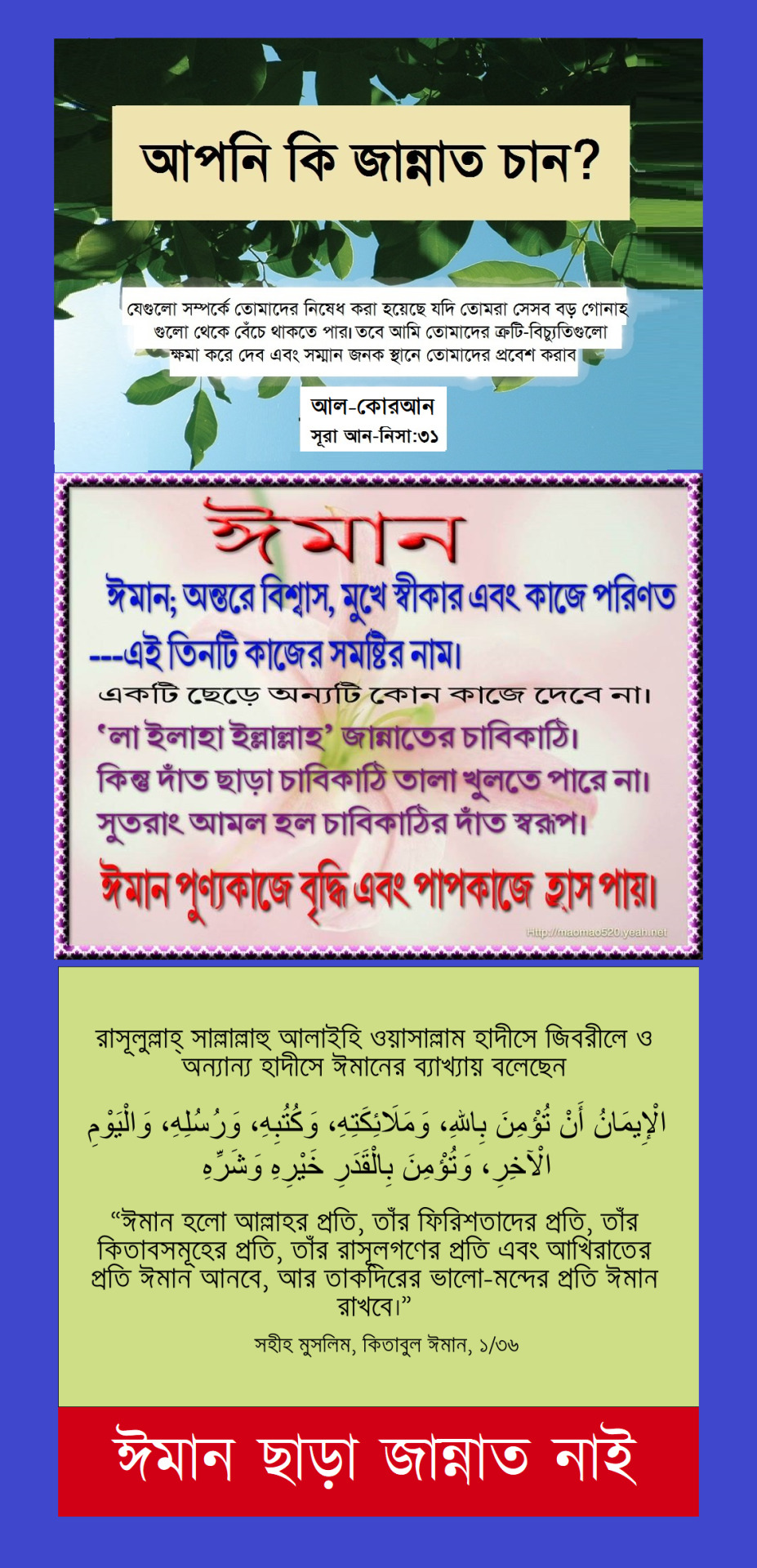
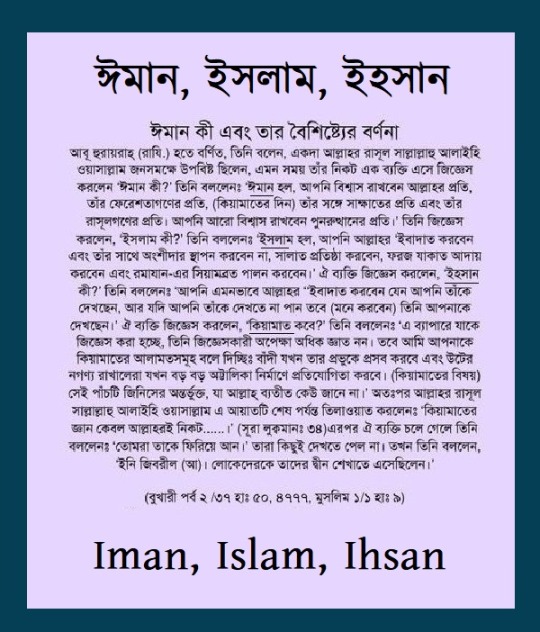






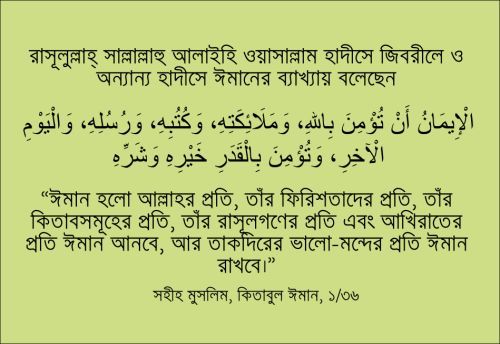




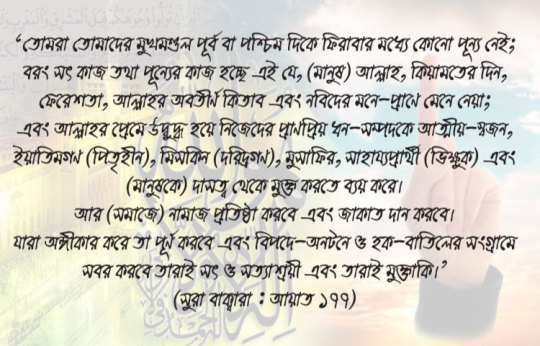

ঈমান-আকিদাহ
Iman-Aqidah
ঈমান শব্দটির আভিধানিক অর্থ হলো স্বীকৃতি দেওয়া, স্বীকার করা বা মেনে নেওয়া। অর্থাৎ কোন বিষয়ে বিশ্বাসের প্রকৃতি বা ধরনের নাম হলো আকীদা, আর কোন আকীদা বা বিশ্বাসকে স্বীকৃতি দেওয়া বা মেনে নেওয়ার নাম হলো তার উপর ঈমান আনা।
ঈমান কাকে বলে?
ঈমান (إِيمَان 'ঈমান', শাব্দিক অর্থ প্রচলিতমতে বিশ্বাস, মতান্তরে স্বীকৃতি)শব্দের আভিধানিক অর্থ স্বীকার করা, স্বীকৃতি দেওয়া, অনুগত হওয়া মতান্তরে দৃঢ় বিশ্বাস করা। এটি কুফর বা অস্বীকার করা বা অবাধ্যতার বিপরীত। ইসলাম ধর্মে ঈমানের অর্থ অত্যন্ত ব্যাপক।
ঈমানের রুকন কয়টি ও কি কি?
ঈমানের রুকন ৬টি। সেগুলি হচ্ছে, আল্লাহ্র প্রতি ঈমান, তাঁর ফেরেশতামণ্ডলীর প্রতি ঈমান, তাঁর কিতাবসমূহের প্রতি ঈমান, তাঁর রাসূলগণের প্রতি ঈমান, আখেরাতের প্রতি ঈমান এবং তাক্বদীরের ভাল-মন্দের প্রতি ঈমান। কুরআনুল কারীম এবং সহীহ হাদীসের বক্তব্য অনুযায়ী উক্ত রুকনসমূহের প্রত্যেকটির প্রতি ঈমান না আনা পর্যন্ত কারো ঈমান পূর্ণ হবে না। যে ব্যক্তি এগুলির কোনো একটিকে অস্বীকার করবে, সে ঈমানের গণ্ডি থেকে বের হয়ে যাবে।
“রাসূলের নিকট তাঁর প্রতিপালকের পক্ষ থেকে যে অহি অবতীর্ণ হয়েছে, তাকে তিনি এবং মুমিনগণ মনেপ্রাণে বিশ্বাস করেছেন। তাঁরা সবাই ঈমান এনেছেন আল্লাহ্র প্রতি, তাঁর ফেরেশতামণ্ডলীর প্রতি, তাঁর কিতাবসমূহের প্রতি এবং তাঁর রাসূলগণের প্রতি। (তাঁরা বলে,) আমরা তাঁর রাসূলগণের মধ্যে কোন তারতম্য করি না। তাঁরা বলে, আমরা শুনেছি এবং মেনে নিয়েছি। হে আমাদের পালনকর্তা! আমরা আপনার কাছে ক্ষমা চাই এবং আপনারই নিকট প্রত্যাবর্তন করতে হবে” (বাক্বারাহ ২৮৫
ঈমানের মৌলিক ৬ স্তম্ভ
The basic 6 pillars of faith
ঈমান ঠিক না করে জীবনভর নেক আমল করলেও আখেরাতে কোনো লাভ হবে না। জিবরাঈল (আ.) আল্লাহর পক্ষ থেকে ছদ্মবেশে এসে রাসুলুল্লাহ (সা.) কে জিজ্ঞাসা করলেন, ঈমান কাকে বলে? জবাবে রাসুলুল্লাহ (সা.) বললেন, ‘ঈমানের হাকিকত বা স্বরূপ হলো, তুমি বদ্ধমূলভাবে বিশ্বাস স্থাপন করবে আল্লাহ তায়ালার প্রতি, তাঁর ফেরেশতাদের প্রতি, আসমানি কিতাবগুলোর প্রতি, আল্লাহর নবী-রাসুলদের প্রতি, কেয়ামত দিবসের প্রতি এবং তকদিরের ভালো-মন্দ সবকিছুই আল্লাহর পক্ষ থেকে নির্ধারিত হওয়ার প্রতি।’ (বোখারি : ৫০)। উল্লিখিত হাদিসটি ‘ঈমানে মুফাসসাল’ এর ভিত্তি। ঈমানে মুফাসসালে ঘোষণা করা হয়, আমি ঈমান আনলাম, ১. আল্লাহ তায়ালার প্রতি, ২. তাঁর ফেরেশতাদের প্রতি, ৩. তাঁর কিতাবগুলোর প্রতি, ৪. তাঁর নবী-রাসুলদের প্রতি, ৫. কেয়ামত দিবসের প্রতি, ৬. ভালো-মন্দ তকদিরের প্রতি
ঈ- ঈমান বিশুদ্ধ করে হবো ধন্য
ঈমান ছাড়া জান্নাত নাই
যারা মুসলিম তারাই জান্নাতে যাবে
youtube
ঈমান ছাড়া জান্নাত নাই
0:04 / 0:39
ঈমান কাকে বলে? || ঈমান ছাড়া জান্নাত নাই
youtube
ঈমানের সংরক্ষণ -
youtube
ঈ- ঈমান বিশুদ্ধ করে হবো ধন্য
ঈমান ছাড়া জান্নাত নাই
There is no paradise without faith
ঈমান-আকিদাহ
#ঈমান#Youtube#ঈ- ঈমান বিশুদ্ধ করে হবো ধন্য#ঈমান ছাড়া জান্নাত নাই#There is no paradise without faith#ঈমান-আকিদাহ#Iman-#Aqidah#Iman-Aqidah#ঈ#ঈদ#E#Eiman#I will be blessed by purifying faith#Iman#Eid#ঈমানেররোকন#ঈমান বিশুদ্ধ করি জান্নাত লাভের জনা#Purify faith to gain paradise
0 notes
Text
Question
Dear father Angelo,
First of all, I wanted to send you my warmest compliments for your answers, which are clear and comprehensive as always. I often read some of the questions raised by the website visitors, since I'm fascinated by all the topics related to moral theology.
My name is Daniele, and I've always been a particularly kind and calm guy. I attend Mass and go to Confession frequently. I also do voluntary work when possible. I usually spend at least one hour in prayer per day; however, like any other human being, I have my weaknesses. And what weakness could it be other than autoeroticism?
Talking with my friends, but also with a lot of other people, I noticed that masturbating is seen as a regular day-to-day activity. If only they knew what they're missing! Since I've started attending Holy Mass more frequently, strengthening my faith, I don't share that common opinion anymore, because after committing such acts I immediately feel repentant, impure and unworthy before God.
I also wasn't fully aware of this matter in the past, and I was oblivious to how much I sinned in the last years!
Since I have gained knowledge about all this, I've been trying to live more chastely and to avoid falling into error and temptation: I must say that it's going very well (and I'm pleased about that).
But here's my question: I wasn't aware of the fact that masturbating is a sin, but did I gravely offend God anyway?
Moreover, I would like to benefit again from your knowledge. As I was trying to further the relation between Religion and Sexuality, I came across the following passage from the Scriptures: «When a man has an emission of seed, he shall bathe his whole body in water and be unclean until evening.
Any piece of cloth or leather with seed on it shall be washed with water and be unclean until evening.
If a man lies carnally with a woman, they shall both bathe in water and be unclean until evening» (Leviticus 15, 16-18).
In verse 16 there is a reference to the emission of seed, but not from sexual intercourse, therefore it is an explicit reference to the practice of auto-erotism. In this respect, the text states "he shall bathe his whole body", with no sentiment of shame attributed to it. How can this passage of scripture be interpreted?
Thank you in advance, father!
Answer
My dear,
1. I'm happy to highlight the fact that you pray every day for one hour. I'm sure that for you prayer is like quenching thirst and hunger.
The encounter with God through Christ is always satiating.
2. In this regard, I like to remember what the holy Curé d'Ars used to say to his parishioners:
«Prayer is nothing but the union with God.
When someone is pure of heart and united with God, he is taken by a certain suavity and sweetness that inebriates, he is purified by a mysterious light shining around him.
In this intimate union, God and the soul are like two pieces of wax fused together that no one can separate anymore.
How beautiful this union between God and His little creature is!
This is a Happiness that can't be understood.
We had become unworthy of praying. In His goodness, however, God allowed us to talk to Him.
Our prayer is incense, all the more welcome by Him.
My children, your heart is little, but prayer expands it, giving the possibility to love God.
Prayer is an anticipation of Heaven, like something coming down from Paradise. Prayer never leaves us without sweetness.
Prayer is honey dripping in the soul, making everything sweet» (A.Monnin, Espirit du Curé d'Ars, pp. 87-88).
3. I would like to underline another thing in your email.
You wrote: «I talked with my friends, but also with a lot of other people, and I noticed that masturbating is seen as a regular day-to-day activity...
Since I've started attending Holy Mass more frequently, strengthening my faith, I don't share that common opinion anymore, because after committing such acts I immediately feel repentant, impure and u
nworthy before God».
4. Well, I'll comment on your words with what the Magisterium of the Church said in the declaration "Persona Humana" (29.XII.1975) from the Congregation for the doctrine of the faith: «both the Magisterium of the Church - in the course of a constant tradition - and the moral sense of the faithful have declared without hesitation that masturbation is an intrinsically and seriously disordered act.
The main reason is that, whatever the motive for acting this way, the deliberate use of the sexual faculty outside normal conjugal relations essentially contradicts the finality of the faculty.
For it lacks the sexual relationship called for by the moral order, namely the relationship which realizes "the full sense of mutual self-giving and human procreation in the context of true love" (Gaudium et Spes 51).
All deliberate exercise of sexuality must be reserved to this regular relationship» (PH 9).
5. The Magisterium of the Church matches your words "after committing such acts I immediately feel repentant, impure and unworthy before God" by affirming that this act is perceived as wrong without hesitation by the moral sense of the faithful.
As you can see, it is specified that masturbation is perceived as wrong by "the faithful", i.e. those who started living the union with God through grace.
In fact, it can happen that others don't perceive anything.
6. You ask me if you still gravely offended God since you didn't know that those actions were sinful.
I'll answer you with this teaching by Saint John Paul II: «It is possible that the evil done as the result of invincible ignorance or a non-culpable error of judgment may not be imputable to the agent; but even in this case it does not cease to be an evil, a disorder in relation to the truth about the good. Furthermore, a good act which is not recognized as such does not contribute to the moral growth of the person who performs it; it does not perfect him and it does not help to dispose him for the supreme good» (Veritatis Splendor 63).
7. Lastly, let me answer your question on biblical matters.
It must be said that this passage doesn't refer to moral but ritual purity.
This text is all about the cleanness required for worship, and not about sins.
For ancient Jews, even any dispersion of blood, such as menstruations, were the cause for impurity.
One became impure also by touching corpses.
However, this wasn't a moral impurity, and therefore a sin, but it simply related to the ritual cleanliness which was required to access worship.
In this passage from Leviticus, the emission of seed is the one of marital intimacy or the natural phenomenons of pollution which ancient Jews believed unfitted for worship, therefore ensuing the need for purification. It has nothing to do with auto-erotism.
All these ritual norms dropped with the New Testament because the only purity Our Lord wants is that of the heart.
I thank you for the precious testimonies you offered.
I wish you many good things from the Risen Lord, I bless you and assure you of remembrance to Him in prayer.
Father Angelo
0 notes
Text
49 years ago The Exorcist had a premiere

In the Ancient Mesopotamia serious diseases were diagnosed as the effects of either various demons, a ghost, witchcraft or an angry god. For the success of the cure it was important to know the exact nature of the illness. The purpose of various rituals employer by the exorcist was both to purify the patient, thus freeing him from the impurity and sin he might committed, and to restore the relations between him and the gods. Moreover the demon (or ghost) had to be expelled or the sorcery undone. One way was to offer a substitute for the patient, usually a goat or pig. (Thomsen 2001, 71.)🐷

🧔♀️Jesus of Nazareth exorcised demons, healed the sick and raised Lazarus from the dead and predicted future events, just like miracle-worker. But his motivations were different kind, compassion, not merely to impress or gain money. Power came from God. (Luck 1999, 124–125.)

😇An exorcist speaks with the authority of God to cast out demons. In contemporary Catholicism, exorcists claim to confront the devil not only with the authority of God, but also with that of the church, which they themselves have received by an explicit license. (Young 2016,5).

The intense, confrontational and dramatic exorcisms that captured popular imagination in films such as The Exorcist, placing great emphasis on the power of words uttered by a priest, are a distinctly modern phenomenon. (Ibid.)🤮

👄Regan truly is like Barbara Creed puts it (1993) a woman as possessed monster. Connections drawn in the film between feminine desire, sexuality and abjection suggest that more is at stake than a simple case of demonic possession.

♀️Feminist theory considers the film Exorcist, a demonization of female sexuality (Välimäki 2010). According to Creed (1993): “The Exorcist is usually seen as involving a case of possession by the male devil. However, I will argue that the devil, in this case, may well be female.”

👹Krzywinska (2000, 39) have a different opinion she talks about fear of the “primal father”. This is originally Freud’s theory from the book TotemAndTaboo, it has been criticized and his way of interpreting history too, but the book was also very innovative in that time. Freud wrote also about one possession case, about J. C. Haizmann (1651/52 – 1700). Freud interpreted the Devil as a father figure for the painter. 🎨😈

🪦I feel also that philosopher Georges Bataille is right when he is talking about Freud’s theory, that perhaps in the center of the fear is not the “primal father” but Annihilation anxiety or dedifferentation anxiety (Tähkä 1993). This is like fear of death and/or rejection.
🧪The demon (unheimlich) is the horror, a normal everyday life is shaken, control disappears and the evil one invades the world. Like the witch in the movie Hagazussa, so in the Excorcist, the woman’s body and its toxicity are at the center.

✝️Doubtful Thomas, Father Karras is living in his own phase of change. His mother is getting older, he has lost his faith and sees only a depressed world around him. Father Merrin, on the other hand, feels the closeness of his death. Regan's mother has lost faith in her work. She wants to keep her child daughter not this monster. All the Hope is in the recovery of Regan. Her room is a gateway to underworld, Witches sabbath with all perversions, sinful pleasures and horrors. The Heart of Darkness. The Ritual is only way out, “primary father “ or Lilith must be cast out from the paradise back to the desert.🏜

#exorcism#the exorcist#william friedkin#william peter blatty#movies#horror film#cinema#film#history#horror#psychoanalysis#feminism#freud#psychology#demonology#catholiscism#1970s movies#lilith#SoundCloud
1 note
·
View note
Text

Allah calls Himself Al-Barr—The Source of Goodness, the kind Benefactor— on one occasion in the Quran. He is the one is the most kind and courteous, the one who is gentle with His servants. Al-Barr is the source of all kindness and goodness, doing good to creation through all His blessings and favours!
The Kind and Gracious Benefactor, The Righteous
Barr comes from the root baa-raa-raa, which points to five main meanings. The first main meaning is to be devoted and gentle and the second is to be just, proper and honest. The third main meaning is to be have regard for someone’s circumstances and the fourth is to bestow bountiful gifts and be ample. The fifth main meaning is to do good and be righteous.
This root appears 32 times in the Quran in three derived forms. Examples of these forms are al-birra (the righteousness), al-abraari (the righteous) and al-barr (the land).
Linguistically, al-Birr is a unique word that entails all acts of righteousness and good conduct [Ibn ‘Hajar Al-Haytami] Al-Barr is the source of all righteousness, the One from whom every good deed comes. Al-Barr is the One who does not stop His ihsaan because of the sins and disobedience of His slaves [Imam al-Qurtubi] He is the One who is kind to the wrongdoers, pardons transgression, forgives the sinner, turns to the one who repents to Him, accepts the plea of those who ask Him. He has turned to His slaves with praiseworthy actions and good expectations, while He is the most deserving of them [Ar-Raazi]!
Al-Barr Himself says: Indeed, we used to supplicate Him before. Indeed, it is He who is the Beneficent, the Merciful. [Quran, 52:28]
Al-Birr versus al-‘ithm
In the sunnah we find a beautiful explanation of what al-birr is and it’s opposite: al-‘ithm. A man came asking the Messenger of Allah salallahu ‘alayhi wa sallam about righteousness and sin. So the Prophet said: Righteousness (al-birr) is good behaviour, and sin (al-‘ithm) is what fluctuates in your chest, and you would hate that the people discovered it about you [At-Tirmidhee]
How Can You Live by This Name?
Allah ‘azza wa jall explains beautifully the definition of al-birr in one ayah in the Quran. This ayah is a list of characteristics for the true believer to live by[Quran 2:177]:
1. Take care of your emaan.
Righteousness is not that you turn your faces toward the east or the west, but [true] righteousness is [in] one who believes in Allah, the Last Day, the angels, the Book, and the prophets.. [Quran, 2:177] The first thing is to have faith and believe in Allah Al-Barr, in the Day He will recompense you according to your good and bad deeds and in the Angels He sends of which some to write down your actions of righteousness and sin. Al-Barr revealed His message to mankind through His books and the prophets, in order to guide you on the path of al-Birr! Make sure you study the arkaan ul emaan (the pillars of faith).
2. Spend on charity.
. . . and gives wealth, in spite of love for it, to relatives, orphans, the needy, the traveler, those who ask [for help], and for freeing slaves . . . [Quran, 2:177] Straight after emaan Al-Birr mentions spending your money on family and those in need for it. Money sometimes gets dearer to us than anything else, Al-Barr reminds you that spending in His cause is the way to gain al-birr!
3. Purify yourself to prayer and zakah.
. . . [and who] establishes prayer and gives zakah . . . [Quran, 2:177] Let your prayer purify you spiritually by learning the meanings of what you say and concentrating on your salah, taking every moment to ask Al-Barr for goodness and righteousness. Give zakah to purify your wealth!
4. Keep your promises and speak and act upon the truth.
. . . [those who] fulfill their promise when they promise . . .[Quran, 2:177] Keep your promises, no matter how big or small, even if it’s a promise to your sibling to help with homework or promising a sweet to your child. The prophet sallallahu ‘alayhi wa sallam also said, Truthfulness leads to Al-Birr andAl-Birr leads to Paradise. And a man keeps on telling the truth until he becomes a Siddiq (truthful person). Falsehood leads to Al-Fujur (i.e., wickedness, evil-doing, etc.), and Al-Fujur leads to the (Hell) Fire, and a man keeps on telling lies till he is written as a liar before Allah [Al-Bukharee] Don’t accept any lies from yourself, not even “white lies” or lying while joking!
5. Have sabr.
. . . and [those who] are patient in poverty and hardship and during battle. Those are the ones who have been true, and it is those who are the righteous[Quran, 2:177] Practising patience in hard times is your best training to cultivate al-birr. Next time you go through a test, tell yourself: it’s all part of a bigger plan. Your vehicle is sabr, on the road of al-birr, leading you to Jannah in shaa Allah!
6. Treat your parents and children well.
Ibn ‘Umar said: Allah has called them the ‘dutiful’ (al-Abrar) because they are dutiful (birr) to their parents and children. Just as you have a duty which you owe your parent, so you have a duty which you owe your child. [Al-Bukharee] Make an effort to be a good child to your parents and a good parent to your child!
7. Don’t be hasty.
On the day of `Arafat, the Prophet salallahu ‘alayhi wa sallam heard a great hue and cry and the beating of camels behind him. So he beckoned to the people with his lash, “O people! Be quiet. Hastening is not a sign of righteousness. [Al-Bukharee] Try to do your daily life activities in a modest manner, for example don’t walk loudly and hasty on the street in a way you are causing others inconvenience!
8. Ask Al-Barr.
Ask Al-Barr to guide you to al-birr. A supplication of the sunnah asking for al-birr, is the dua for travelling; make sure you apply it each time you travel!*
O Allah, Al-Barr, we know that You are the source of all that is good. Adorn us with the characteristics of the abraar (righteous ones), guide us in good conduct in each company we are in, and make our righteousness a way to lead us to Your Paradise, ameen!
#allah#revert help team#islam#asma al husna#muslim#revert help#ayat#daily#dua#allah’s name#pray#prayer#salah#muslimah#hijab#religion#reminder#mohammed#new muslim#new revert#new convert#how to convert islam#convert help#convert islam#become a muslim#welcome to islam#hadith#daily ayat#prophet#god
7 notes
·
View notes
Text
Grandrapa
Gandrapa was a prince of Nalanda but renounced the throne to be a monk, and later, a yogin. In his travels he met the guru Darikapa and was initiated into the Samvara mandala. He then travelled to Pataliputra, where King Devapala, a pious man welcomed monks and yogins into his kingdom. The king however, had a troubled mind, he still felt he had not accumulated enough merit for his next rebirths despite being a devout man. When he heard of Ghantapa from his wife, the royal pair decided to invite the holy man as their priest, however, the envoy they sent returned bearing news that the yogin refused. The next day, the king went in person to the master, prostrating himself before Ghantapa, the king begged him to come to the palace, but Ghantapa refused again. Everyday, for 40 days the king returned to Ghantapa to repeat his invitation, and was refused everyday. Finally, the king’s pride was wounded and instead of pursuing their attempt to invite the yogin, he developed hatred for the holy man to the point they offered half of their kingdom to whoever was able to prove the yogin’s virtue and chastity as merely a sham.
Darima, out of greed, accepted the king’s challenge and set off to send her beautiful daughter to ensnare the monk. Much like the king, Darima visited the yogin everyday, prostrating to him for 9 days offering him nothing but devotion. On the 10th day, she begged him to allow her to be his patron during his summer monsoon retreat. Ghantapa refused, but Darima was persistent, returning again and again for a month. Finally, seeing no harm, Ghantapa agreed. When the rain came, the yogin retreated to a little hut Darima had constructed for him at the far edge of her property. Warily, the monk insisted only male servants bring him food, which Darima agreed. However, on the 15th day, she sent her daughter to the hut. Surprised, Ghantapa insisted the girl leave immediately, but it began to rain heavily, so the monk agreed to share his hut with the girl until the rain stopped. Unfortunately the rain continued until sunset, with the excuse of being afraid she would be mugged by thieves, the monk allowed her to sleep outside the hut. But during the night, she became frightened and began to beg for his protection. With a sigh of resignation, Ghantapa allowed her to come inside the hut.
The hut was very tiny. Inevitably, their bodies touched. Then their limbs intertwined. Before long, they had passed through the 4 levels of joy and traversed the path of liberation to its ultimate fulfillment. In 6 previous lives, this very girl was the cause of the monk’s downfall, but in this life, such defilement had long since dissolved, and he had gained the true path. In the morning, he asked the girl to remain with him and she agreed. They became yogin and consort, and because of her service to him for 6 lives, the defilements of Ghantapa’s consort’s mind were also purified. One year later, their child was born.
Darima never told any of this to the king, and finally at the 3rd year, when she thought the time was right, she informed the king. The king was overjoyed for the monk’s downfall and said he will visit the monk and the girl in 3 days time.
When they heard the news, the girl was very fearful. When Ghantapa asked if she wanted to stay and face them down, or leave Pataliputra, she begged him to flee with her, and he agreed. However, as they were leaving, they came face to face with the king and his followers. The king, looking down at the fleeing pair demanded answers for what he saw before him. The monk simply replied, “I’m carrying a jug of liquor, I have my son under my robe, and this is my consort.
When the king kept on repeating the accusations of what appeared to be Ghantapa’s fault, Ghantapa hurled both his son and the jug of liquor onto the ground. This so frightened the earth goddess that she trembled with fear. The ground gaped open and a geyser of water began to flood the entire space. The child was instantly transformed into a thunderbolt and the jug into a bell. Whereupon the yogin, bearing thunderbolt and bell, levitated with his consort into the sky, where they become the deities Samvara and Vajra Varahi joined in father-mother union.
The drowning people screamed, declaring they would take refuge in the master, but Ghantapa remained adamant in his Samadhi of immutable wrath. Suddenly, the Bodhisattva of Compassion appeared. Avalokitesvara placed his holy foot over the source of the flood and the water immediately flowed backward into the ground, and as if by magic, a stone image of the Bodhisattva appeared where his foot had trod. It remains there to this very day.
Everyone was saved. Prostrating themselves, they begged for forgiveness. Still hovering above the assemblage, Ghantapa said “Moral concepts practiced without understanding can be the greatest of obstacles to fulfilling the Bodhisattva’s vow of uncompromising compassion. Do not cultivate virtue and renounce vice. Rather, learn to accept all things as they arise. Penetrate the essence of each experience until you have achieved the one taste.”
At this, everyone was illuminated and their self-righteousness and petty prejudice vanished. Faith was born in the lotus of each heart. Ghantapa’s fame rang out to all the corners of the earth. Possessing the power and virtue of a Buddha, the yogin ascended into the Paradise of the Dakinis with his consort.
4 notes
·
View notes
Text
QUESTIONS & ANSWERS: Since God Knows What We Will Do, Why Does He Send Us Here?
In short, we are sent here to improve our abilities and skills through the responsibilities He ordains for us. Not all people are created with the same ability and the same disposition; rather, they are like rough minerals waiting to be purified and refined.
For example, artists want to express their talents, and so are known by the resulting works of art. In the same way, creation's majesty, splendor, and artistry present and reflect His sacred Names and Attributes. To show us His art, He created the universe and exhibited aspects of His mysterious, hidden treasures within it. To show us how His Names, Attributes, and Divine Art become manifest, He created the universe step by step. He grants us countless opportunities to know Him better and to acquire sound knowledge about Him. He is the absolute Creator who makes everything from one, and adds thousands of benefits to whatever He wills.
Humanity is placed in creation to be tested, purified, and prepared for eternal bliss in Paradise. In one hadith, Prophet Muhammad said: "Human beings are like minerals. One who is good in jahiliyya (pre-Islamic Arabia) is also good in Islam." For example, 'Umar enjoyed dignity, glory, and honor before Islam, but acquired even more when he became a Muslim.
He gained a calmer dignity, more tenderheartedness, and the grandeur of faith. Before his conversion, he might have been tough, quick-tempered, and haughty, one who thought he had everything; afterward, he was a most modest and humble person. Therefore, when we see well-mannered, dynamic, energetic, audacious, and spirited people, we hope that they will become Muslim.
Islam deals with the most precious and valuable mineral—humanity. It kneads, improves, and matures each individual so that all impurities are expelled. The Companions were 100 percent pure. Muslims gradually began to decline in purity, to such an extent that in our own time some people retain hardly any purity. As a result, we have experienced great troubles and problems.
God knows the final result of this test, as He is not bound by time. Therefore, He tests us so that we may become aware of what we really are by testing ourselves against ourselves and against others. This testing is a process to determine our value, to learn if we are iron or gold. We are tested in what we strive for and in what we do. One day, we shall enter God's presence and give account of ourselves: But their hands will speak to us, and their feet bear witness to all that they did (36:65).
#allah#quran#god#muhammad#prophet#ayah#islam#muslim#muslimah#sunnah#hadith#revert#convert#dua#salah#pray#prayer#welcome to islam#how to convert to islam#new convert#new muslim#new revert#revert help#convert help#islam help#muslim help#reminder#religion#hijab#help
1 note
·
View note
Text
TAFSIR: Risale-i Nur: The Twenty-Ninth Letter - Part 69
The Fourth is to understand by means of the pure Sufi way the knowledge of God to be found in belief in God, and the pleasure of love of God within the knowledge of God, and by so understanding, to be saved from the desolation of this world and man’s exile in the universe. We have proved in many of the Words that the happiness of both worlds, and pain-free pleasure, and intimacy untainted by loneliness, and true delight, and untroubled happiness are all to be found in faith and the reality of Islam. As is explained in the Second Word, faith produces the seed of a Tuba-tree of Paradise. It is through the training and nurturing of the Sufi path that the seed grows and develops.
The Fifth is to perceive through an awakening of the heart elicited by the Sufi path and remembrance of God, the subtle truths contained in the obligations of the Shari‘a, and to appreciate them. Then the person obeys and performs his worship, not under compulsion, but with longing.
The Sixth is to rise to the station of reliance on God and the rank of sub mission to Him and winning His pleasure, which are the means of obtaining true delight, real solace, painfree pleasure, and friendship untainted by loneliness.
The Seventh is, through sincerity, which is the essential precondition for travelling the Sufi way and its most valuable result, to be delivered from base qualities like implicitly associating partners with God, hypocrisy, and artificiality. It is also to be saved, through purifying the soul, which is like the surgical operation of the Sufi path, from the dangers of the evil-commanding soul and the perils of egotism.
The Eighth: Through the regard, sense of the divine presence, and powerful intentions of the Sufi path, gained by recalling God with the heart and reflecting on Him with the mind, this is to transform customary actions into worship and make mundane dealings into actions benefiting the hereafter. Utilizing the capital of life, it is to make all its minutes into seeds that will produce the shoots of eternal happiness.
The Ninth is to struggle to be a perfect human being through journeying with the heart and striving with the spirit and spiritual progress; that is to say, to be a true believer and total Muslim; that is, to gain not superficial belief, but the reality of belief and the reality of Islam; that is, to be directly the bondsman of the Glorious Creator of the Universe, in the universe and in one respect as the universe’s representative, and to be His addressee, and friend, and beloved, and to be a mirror to Him; and through showing man to be on the best of patterns, it is to prove man’s superiority to the angels. It is to fly through the lofty stations with the Shari‘a’s wings of faith and works, and to behold eternal happiness in this world, and even to enter upon it.
Glory be unto You! We have no knowledge save that which You have taught us; indeed, You are All-Knowing, All-Wise!(2:32)
O God! Grant blessings and peace to the Supreme Help in every age and the Sublime Spiritual Pole at all times, our master Muhammad, the magnificence of whose sainthood was manifested in his Ascension, as was the station of his being the beloved of God, and under the shadow of whose Ascension are included all sainthoods, and to all his Family and Companions. Amen. And all praise be to God, the Sustainer of All the Worlds.
#allah#god#islam#muslim#revert#reverthelp#reverthelp team#convert#new revert#new convert#new muslim#muslim revert#muslim convert#welcome to islam#revert to islam#convert to islam#how to convert to islam#prophet#muhammad#quran#sunnah#hadith#dua#pray#prayer#Salah#Help
2 notes
·
View notes
Text
Forgiveness and Tolerance in Islam: Islam as a Religion of Universal Mercy
Life is the foremost and most manifest blessing of God Almighty, and the true and everlasting life is that of the Hereafter. Since we can deserve this life only by pleasing God, He sent Prophets and revealed Scriptures out of His Compassion for humanity. While mentioning His blessings upon humanity, He begins:
All-Merciful. He taught the Qur'an, created humanity, and taught it speech. (Al-Rahman 55:1-4)
All aspects of this life are a rehearsal for the afterlife, and every creature is engaged toward this end. Order is evident in every effort, and compassion resides in every achievement. Some “natural” events or social convulsions may seem disagreeable at first, but we should not regard them as being incompatible with compassion. They are like dark clouds or lightning and thunder that, although frightening, nevertheless bring us the good tidings of rain. Thus the whole universe praises the All-Compassionate.
Prophet Muhammad, peace and blessings be upon him, is like a spring of pure water in the heart of a desert, a source of light in an all-enveloping darkness. Those who appeal to this spring can take as much water as is needed to quench their thirst, to become purified of their sins, and to become illuminated with the light of faith. Mercy was like a magical key in the Prophet’s hands, for with it he opened hearts that were so hardened and rusty that no one thought they could be opened. But he did even more: he lit a torch of belief in them.
The compassion of God’s Messenger encompassed every creature. He desired that everyone be guided. In fact, this was his greatest concern:
Yet it may be, if they believe not in this Message, you will consume (exhaust) yourself, following after them, with grief. (Al-Kahf 18:6)
But how did he deal with those who persisted in oppression and persecutions; those who did not allow him and his followers to worship the One God; those who took up arms against him to destroy him? He had to fight such people, yet his universal compassion encompassed every creature. This is why when he was wounded severely at the Battle of Uhud, he raised his hands and prayed:
O God, forgive my people, for they do not know.[ Qadi ‘Iyad, Shifa’, 1:78-9; Hindi, Kanz al-'Ummal, 4:93. ]
The Makkans, his own people, inflicted so much suffering on him that he finally emigrated to Madina. Even after that, the next 5 years were far from peaceful. However, when he conquered Makka without bloodshed in the twentyfirst year of his Prophethood, he asked the Makkan unbelievers: “How do you expect me to treat you?” They responded unanimously: “You are a noble one, the son of a noble one.” He then told them his decision: “You may leave, for no reproach this day shall be on you. May God forgive you. He is the Most Compassionate.”[ Ibn Hisham, Sirat al-Nabawiyah, 4:55; Ibn Kathir, Al-Bidayah wa al-Nihayah, 4:344. ] 825 years later Sultan Mehmed II[ Sultan Mehmed II (the Conqueror) (1431-1481). The 7th Ottoman Sultan who conquered Istanbul in 1453. ] said the same thing to the defeated Byzantines after conquering Constantinople. Such is the universal compassion of Islam.
The Messenger displayed the highest degree of compassion toward believers:
There has come to you a Messenger from among yourselves; grievous to him is your suffering; anxious is he over you, full of concern for you, for the believers full of pity, compassionate. (At-Tawbah 9:128)
He lowered unto believers his wing of tenderness through mercy … (Al-Hijr 15:88)
… was the guardian of believers and nearer to them than their selves. (Al-Ahzab 33:6)
When one of his Companions died, he asked those at the funeral if the deceased had left any debts. On learning that he had, the Prophet mentioned the above verse and announced that the creditors should come to him for repayment.
His compassion even encompassed the hypocrites and unbelievers. He knew who the hypocrites were, but never identified them, for this would have deprived them of the rights of full citizenship that they had gained by their outward declaration of faith and practice. Since they lived among the Muslims, their denial may have been reduced or changed to doubt, thus diminishing their fear of death and the pain caused by the assertion of eternal non-existence after death.
God no longer destroys unbelievers collectively, although He had eradicated many such people in the past:
But God would never chastise them while you were among them; God would never chastise them as they begged forgiveness. (Al-Anfal 8:33)
This verse refers to unbelievers regardless of time and place. God will not destroy whole peoples as long as there are some who follow the Messenger. Moreover, He has left the door of repentance open until the Last Day. Anyone can accept Islam or ask God’s forgiveness, regardless of how sinful they consider themselves to be.
For this reason, a Muslim’s enmity toward unbelievers is a form of pity. When 'Umar saw an 80-year-old man, he sat down and wept. When asked why, he replied: “God assigned him so long a lifespan, but he has not been able to find the true path.” 'Umar was a disciple of God’s Messenger, the prophet who said:
I was not sent to call down curses on people, but as a mercy.[ Muslim, Birr, 87. ]
I am Muhammad, and Ahmad (the praised one), and Muqaffi (the Last Prophet); I am Hashir (the last Prophet in whose presence the people will gather); the Prophet of Repentance (the Prophet for whose sake the door of repentance will always remain open), and the Prophet of mercy.[ Hanbal, Musnad, 4:395; Muslim, Fada'il, 126. ]
Archangel Gabriel also benefited from the mercy of the Qur'an. Once the Prophet asked Gabriel whether he had any share in the mercy contained in the Qur'an, Gabriel replied that he did, and explained: “I was not certain about my end. However, when the verse: (One) obeyed, and moreover, trustworthy and secured (At-Takwir 81:21) was revealed, I felt secure.”[ Qadi 'Iyad, as-Shifa’ al-Sharif, 1:17. ]
The Messenger of God was particularly compassionate toward children. Whenever he saw a child crying, he sat beside him or her and shared his or her feelings. He felt the pain of a mother for her child more than the mother herself. Once he said:
I stand in prayer and wish to prolong it. However, I hear a child cry and shorten the prayer to lessen the mother’s anxiety.“[ Bukhari, Adhan, 65; Muslim, Salat, 192. ]
He took children in his arms and hugged them. Once when he hugged and kissed his grandson Hasan, Aqrah ibn Habis told him: "I have 10 children, none of whom I have ever kissed.” God’s Messenger responded: “One without pity for others is not pitied.”[ Bukhari, Adab, 18. ] According to another version, he added: “What can I do for you if God has removed compassion from you?”[ Ibid., Adab, 18; Muslim, Fada'il, 64. ]
He said: “Pity those on the Earth so that those in the heavens will pity you.”[ Tirmidhi, Birr, 16. ] Once when Sa’d ibn 'Ubadah became ill, God’s Messenger visited him at home. Seeing his faithful Companion in a pitiful state, he began to cry and said: “God does not punish because of tears or grief, but He punishes because of this,” and he pointed to his tongue.[ Bukhari, Jana'iz, 45. When 'Uthman ibn Mad'un died, he wept profusely. During the funeral, a woman remarked: “'Uthman flew like a bird to Paradise.” Even in that mournful state, the Prophet did not lose his balance and corrected the woman: “How do you know this? Even I do not know this, and I am a Prophet.”[ Ibid, Jana'iz, 3. ]
A member of the Banu Muqarrin clan once beat his female slave. She informed the Messenger of God, who then sent a message to the master. He said: “You have beaten her without any justifiable right. Free her.”[ Muslim, Ayman, 31, 33; Ibn Hanbal, Musnad, 3:447 ] Setting a slave free was far better for the master than being punished in the Hereafter because of a wrong act. The Messenger of God always protected and supported widows, orphans, the poor, and the disabled, even before his Prophethood. When he returned home in excitement from Mount Hira after the first Revelation, his wife Khadijah told him:
I hope you will be the Prophet of this community, for you always tell the truth, fulfill your trust, support your relatives, help the poor and weak, and feed guests.[ Ibn Sa’d, al-Tabaqat al-Kubra’, 1:195. ]
His compassion even encompassed animals. We hear from him:
A prostitute was guided to truth by God and ultimately went to Paradise because she gave water to a poor dog dying of thirst inside a well. Another woman was sent to Hell because she made a cat die of hunger.[ Bukhari, Anbiya, 54; Muslim, Salam, 153. ]
Once while returning from a military campaign, a few Companions removed some young birds from their nest to caress them. The mother bird came back and, not being able to find its babies, began to fly around, calling out for them. When told of this, God’s Messenger became angry and ordered the birds to be put back in the nest.[ Abu Dawud, Adab, 164; Ibn Hanbal, Musnad, 1:404 ]
While in Mina, some of his Companions attacked a snake in order to kill it. However, it managed to escape. Watching this from afar, he remarked: “It was saved from your evil, as you were from its evil.”[ Sunan al-Nasa'i, Hajj, 114; Ibn Hanbal, Musnad, 1:385. ] Ibn Abbas reported that God’s Messenger, upon observing a man sharpening his knife directly before the sheep to be slaughtered, asked him: “Do you want to kill it more than once?”[ Hakim, Mustadrak, 4:231. ]
His love and compassion for creatures differed from that of today’s selfproclaimed humanists. He was sincere and measured in his love and compassion. He was a Prophet raised by God, the Creator and Sustainer of all beings, for the guidance and happiness of conscious beings—humanity and jinn—and the harmony of existence. As such, he lived not for himself but for others. He is a mercy for all the worlds, a manifestation of Compassion.
He eradicated all differences of race and color. Once Abu Dharr got so angry with Bilal that he insulted him: “You son of a black woman!” Bilal came to the Messenger and reported the incident in tears. The Messenger reproached Abu Dharr: “Do you still have a sign of jahiliyah (ignorance)?” Full of repentance, Abu Dharr lay on the ground and said: “I will not raise my head (meaning that he would not get up) unless Bilal puts his foot on it.” Bilal forgave him, and they were reconciled.[ Bukhari, Iman, 22. ] Such was the bond of kinship and humanity that Islam created among a oncesavage people.
#allah#god#islam#muslim#quran#revert#convert#convert islam#revert islam#reverthelp#revert help#revert help team#help#islamhelp#converthelp#prayer#salah#muslimah#reminder#pray#dua#hijab#religion#mohammad#new muslim#new revert#new convert#how to convert to islam#convert to islam#welcome to islam
3 notes
·
View notes
Text
ISLAM 101: Muslim Culture and Character: Dynamics of Spiritual Life:
ISLAM AS A RELIGION OF UNIVERSAL MERCY
Life is the foremost and most manifest blessing of God Almighty, and the true and everlasting life is that of the Hereafter. Since we can deserve this life only by pleasing God, He sent Prophets and revealed Scriptures out of His Compassion for humanity. While mentioning His blessings upon humanity, He begins:
All-Merciful. He taught the Qur’an, created humanity, and taught it speech. (Al-Rahman 55:1-4)
All aspects of this life are a rehearsal for the afterlife, and every creature is engaged toward this end. Order is evident in every effort, and compassion resides in every achievement. Some “natural” events or social convulsions may seem disagreeable at first, but we should not regard them as being incompatible with compassion. They are like dark clouds or lightning and thunder that, although frightening, nevertheless bring us the good tidings of rain. Thus the whole universe praises the All-Compassionate.
Prophet Muhammad, peace and blessings be upon him, is like a spring of pure water in the heart of a desert, a source of light in an all-enveloping darkness. Those who appeal to this spring can take as much water as is needed to quench their thirst, to become purified of their sins, and to become illuminated with the light of faith. Mercy was like a magical key in the Prophet’s hands, for with it he opened hearts that were so hardened and rusty that no one thought they could be opened. But he did even more: he lit a torch of belief in them.
The compassion of God’s Messenger encompassed every creature. He desired that everyone be guided. In fact, this was his greatest concern:
Yet it may be, if they believe not in this Message, you will consume (exhaust) yourself, following after them, with grief. (Al-Kahf 18:6)
But how did he deal with those who persisted in oppression and persecutions; those who did not allow him and his followers to worship the One God; those who took up arms against him to destroy him? He had to fight such people, yet his universal compassion encompassed every creature. This is why when he was wounded severely at the Battle of Uhud, he raised his hands and prayed:
O God, forgive my people, for they do not know.[1]
The Makkans, his own people, inflicted so much suffering on him that he finally emigrated to Madina. Even after that, the next 5 years were far from peaceful. However, when he conquered Makka without bloodshed in the twenty-first year of his Prophethood, he asked the Makkan unbelievers: “How do you expect me to treat you?” They responded unanimously: “You are a noble one, the son of a noble one.” He then told them his decision: “You may leave, for no reproach this day shall be on you. May God forgive you. He is the Most Compassionate.”[2] 825 years later Sultan Mehmed II[3] said the same thing to the defeated Byzantines after conquering Constantinople. Such is the universal compassion of Islam.
The Messenger displayed the highest degree of compassion toward believers:
There has come to you a Messenger from among yourselves; grievous to him is your suffering; anxious is he over you, full of concern for you, for the believers full of pity, compassionate. (At-Tawbah 9:128)
He lowered unto believers his wing of tenderness through mercy … (Al-Hijr 15:88)
… was the guardian of believers and nearer to them than their selves. (Al-Ahzab 33:6)
When one of his Companions died, he asked those at the funeral if the deceased had left any debts. On learning that he had, the Prophet mentioned the above verse and announced that the creditors should come to him for repayment.
His compassion even encompassed the hypocrites and unbelievers. He knew who the hypocrites were, but never identified them, for this would have deprived them of the rights of full citizenship that they had gained by their outward declaration of faith and practice. Since they lived among the Muslims, their denial may have been reduced or changed to doubt, thus diminishing their fear of death and the pain caused by the assertion of eternal non-existence after death.
God no longer destroys unbelievers collectively, although He had eradicated many such people in the past:
But God would never chastise them while you were among them; God would never chastise them as they begged forgiveness. (Al-Anfal 8:33)
This verse refers to unbelievers regardless of time and place. God will not destroy whole peoples as long as there are some who follow the Messenger. Moreover, He has left the door of repentance open until the Last Day. Anyone can accept Islam or ask God’s forgiveness, regardless of how sinful they consider themselves to be.
For this reason, a Muslim’s enmity toward unbelievers is a form of pity. When ‘Umar saw an 80-year-old man, he sat down and wept. When asked why, he replied: “God assigned him so long a lifespan, but he has not been able to find the true path.” ‘Umar was a disciple of God’s Messenger, the prophet who said:
I was not sent to call down curses on people, but as a mercy.[4]
I am Muhammad, and Ahmad (the praised one), and Muqaffi (the Last Prophet); I am Hashir (the last Prophet in whose presence the people will gather); the Prophet of Repentance (the Prophet for whose sake the door of repentance will always remain open), and the Prophet of mercy.[5]
Archangel Gabriel also benefited from the mercy of the Qur’an. Once the Prophet asked Gabriel whether he had any share in the mercy contained in the Qur’an, Gabriel replied that he did, and explained: “I was not certain about my end. However, when the verse: (One) obeyed, and moreover, trustworthy and secured (At-Takwir 81:21) was revealed, I felt secure.”[6]
The Messenger of God was particularly compassionate toward children. Whenever he saw a child crying, he sat beside him or her and shared his or her feelings. He felt the pain of a mother for her child more than the mother herself. Once he said:
I stand in prayer and wish to prolong it. However, I hear a child cry and shorten the prayer to lessen the mother’s anxiety.”[7]
He took children in his arms and hugged them. Once when he hugged and kissed his grandson Hasan, Aqrah ibn Habis told him: “I have 10 children, none of whom I have ever kissed.” God’s Messenger responded: “One without pity for others is not pitied.”[8] According to another version, he added: “What can I do for you if God has removed compassion from you?”[9]
He said: “Pity those on the Earth so that those in the heavens will pity you.”[10] Once when Sa’d ibn ‘Ubadah became ill, God’s Messenger visited him at home. Seeing his faithful Companion in a pitiful state, he began to cry and said: “God does not punish because of tears or grief, but He punishes because of this,” and he pointed to his tongue.[11] When ‘Uthman ibn Mad’un died, he wept profusely. During the funeral, a woman remarked: “‘Uthman flew like a bird to Paradise.” Even in that mournful state, the Prophet did not lose his balance and corrected the woman: “How do you know this? Even I do not know this, and I am a Prophet.”[12]
A member of the Banu Muqarrin clan once beat his female slave. She informed the Messenger of God, who then sent a message to the master. He said: “You have beaten her without any justifiable right. Free her.”[13] Setting a slave free was far better for the master than being punished in the Hereafter because of a wrong act. The Messenger of God always protected and supported widows, orphans, the poor, and the disabled, even before his Prophethood. When he returned home in excitement from Mount Hira after the first Revelation, his wife Khadijah told him:
I hope you will be the Prophet of this community, for you always tell the truth, fulfill your trust, support your relatives, help the poor and weak, and feed guests.[14]
His compassion even encompassed animals. We hear from him:
A prostitute was guided to truth by God and ultimately went to Paradise because she gave water to a poor dog dying of thirst inside a well. Another woman was sent to Hell because she made a cat die of hunger.[15]
Once while returning from a military campaign, a few Companions removed some young birds from their nest to caress them. The mother bird came back and, not being able to find its babies, began to fly around, calling out for them. When told of this, God’s Messenger became angry and ordered the birds to be put back in the nest.[16]
While in Mina, some of his Companions attacked a snake in order to kill it. However, it managed to escape. Watching this from afar, he remarked: “It was saved from your evil, as you were from its evil.”[17] Ibn Abbas reported that God’s Messenger, upon observing a man sharpening his knife directly before the sheep to be slaughtered, asked him: “Do you want to kill it more than once?”[18]
His love and compassion for creatures differed from that of today’s self-proclaimed humanists. He was sincere and measured in his love and compassion. He was a Prophet raised by God, the Creator and Sustainer of all beings, for the guidance and happiness of conscious beings—humanity and jinn—and the harmony of existence. As such, he lived not for himself but for others. He is a mercy for all the worlds, a manifestation of Compassion.
He eradicated all differences of race and color. Once Abu Dharr got so angry with Bilal that he insulted him: “You son of a black woman!” Bilal came to the Messenger and reported the incident in tears. The Messenger reproached Abu Dharr: “Do you still have a sign of jahiliyah (ignorance)?” Full of repentance, Abu Dharr lay on the ground and said: “I will not raise my head (meaning that he would not get up) unless Bilal puts his foot on it.” Bilal forgave him, and they were reconciled.[19] Such was the bond of kinship and humanity that Islam created among a once-savage people.
[1] Qadi ‘Iyad, Shifa’, 1:78-9; Hindi, Kanz al-’Ummal, 4:93.[2] Ibn Hisham, Sirat al-Nabawiyah, 4:55; Ibn Kathir, Al-Bidayah wa al-Nihayah, 4:344.
[3] Sultan Mehmed II (the Conqueror) (1431-1481). The 7th Ottoman Sultan who conquered Istanbul in 1453.
[4] Muslim, Birr, 87.
[5] Hanbal, Musnad, 4:395; Muslim, Fada’il, 126.
[6] Qadi ‘Iyad, as-Shifa’ al-Sharif, 1:17.
[7] Bukhari, Adhan, 65; Muslim, Salat, 192.
[8] Bukhari, Adab, 18.
[9] Ibid., Adab, 18; Muslim, Fada’il, 64.
[10] Tirmidhi, Birr, 16.
[11] Bukhari, Jana’iz, 45.
[12] Ibid, Jana’iz, 3.
[13] Muslim, Ayman, 31, 33; Ibn Hanbal, Musnad, 3:447.
[14] Ibn Sa’d, al-Tabaqat al-Kubra’, 1:195.
[15] Bukhari, Anbiya, 54; Muslim, Salam, 153.
[16] Abu Dawud, Adab, 164; Ibn Hanbal, Musnad, 1:404.
[17] Sunan al-Nasa’i, Hajj, 114; Ibn Hanbal, Musnad, 1:385.
[18] Hakim, Mustadrak, 4:231.
[19] Bukhari, Iman, 22.
#allah#god#islam#muslim#quran#revert#convert#convert islam#revert islam#reverthelp#revert help#revert help team#help#islamhelp#converthelp#prayer#salah#muslimah#reminder#pray#dua#hijab#religion#mohammad#new muslim#new revert#new convert#how to convert to islam#convert to islam#welcome to islam
2 notes
·
View notes
Note
How can we Strengthen our Belief? Will you give information about the Increase and Decrease of Belief, Tahqiq (Investigative) and Taqlid (Imitative) Belief and the Importance of Belief? Will you give Information about Investigative and Imitative Belief? Is there a weak or strong belief, how can we understand this?
Faith is a light, a blessing from Allah. However, faith is knowledge at the same time, which must be necessarily learnt. There are two ways to strengthen our faith:
The first and the primary one is to learn the rules of the sunnah and to investigate it in accordance with the Quran and the sunnah, as required by our time.
The second one is to advance in spirituality through performing good deeds, purifying the heart and soul by avoiding sins.
However, the course of this century makes the second way really difficult to take. For this reason, it is very important to read books which teach investigative faith. It has also become essential to study science as a feature of our century, besides studying religious knowledge. This is because ‘the light of the mind is science as the light of the heart is religious knowledge.’ We can state that one of the most important books which teach both of them together is Risale-i Nur Collection. In addition, one can benefit very well from books of significant people such as Imam Ghazali, Imam Rabbani, Imam Mawardi and Imam Qushairi.
Protecting and strengthening faith is a Muslim’s most important issue. It is necessary to attach importance to taqwa (God-Consciousness) in order to protect faith. Faith can only be protected within the castle of taqwa. Without taqwa, faith tends to deteriorate. It is necessary to read and make research on books about faith a lot in order to strengthen faith. Issues about faith which result from knowledge do not have an effect on one’s feelings unless it is filtered through reasoning. Firstly, mind must be satisfied.
Contemplation is very important. The fact that Prophet Abraham found his Lord by watching the moon and stars and contemplating is narrated in the Quran. Faith improves with thinking. For this reason, it is stated in a hadith that “One hour of contemplation is superior to one year of nafilah (supererogatory) prayer.”
Environment has a great influence on human beings. Sins suggest people infidelity. Suggestion has a great influence on human beings. It infuses infidelity into one’s sub-conscious while people are unaware of it. For this reason, one must keep away from sinful places as much as possible. Sins committed outside carelessly suggest people that there are no hereafter and punishment. To be protected from the negative effects of such suggestions, one must keep away from sinful places as much as possible and try to suggest people goodness and prevent them from evil as much as s/he can. One needs to study issues about faith a lot and pay attention to delivered messages in order to compensate for the damages of the negative suggestions which s/he has been exposed to. It is necessary to meet often with people who care about good deeds and live in accordance with taqwa. In this sense, the importance of a community (jama’ah) becomes more obvious. Just like sins suggest infidelity, good deeds suggest faith.
What is the Nature of Belief?
Belief is the greatest blessing and grant of Allah to humans. Allah gives it to His slaves that He wishes. However, it cannot be claimed that the slave has no role in receiving it. On the contrary, the slave should use his preference and will first and be willing for belief and guidance. Allah will give him belief and guidance upon his demand and request. Therefore, some Islamic scholars and saints described belief as, “It is a light that Allah Almighty puts into the heart of a person He wishes after that person uses his partial will and preference in that way.”
Is an increase and development in belief in question?
A seed grows and develops greatly until it becomes a tree; belief is like a tree too. Islamic scholars divide belief into two levels first:
1– Taqlid (imitative) belief,
2– Tahqiq (investigative) belief...
Imitative belief: It means adhering to the fundamentals of belief traditionally without reasoning on the issue as one hears from his parents, teachers and environment. Since imitative belief is a kind of believing that is not based on a detailed belief in the fundamentals and consciousness of belief, it may be exposed to some doubts and delusions and face the risk of faltering and breaking down especially in this age.
Investigative belief: It means knowing all of the issues about belief with evidence and in detail, to approve and believe without hesitation. A belief like that can protect itself from faltering and breaking down when faced by doubts and delusions. There are various degrees of investigative belief. Islamic scholars divide those degrees into three:
1 – Certainty at the degree of knowledge: It means knowing and believing in Islamic issues scientifically and in detail.
2 – Certainty at the degree of witnessing: It means knowing and believing in Islamic issues as if seeing them or as if observing their truthfulness personally.Seeing through eyes and knowing scientifically are very different from the aspect of giving a person an idea. Man can know something definitely, without hesitation but when he sees it, his belief increases. For instance, knowing the existence of America and seeing America personally. Certainty at the degree of witnessing is believing in the fundamentals of belief as if seeing through the eyes.
3 – Absolute certainty: It means accepting and realizing the issues concerning belief by entering into them and experiencing them personally.
The following example can be given to explain the three levels of belief: When smoke is seen somewhere it is known that there is a fire there. To know the presence of fire by seeing the smoke is certainty at the degree of knowledge. To go near the fire and to know the existence of fire by seeing it is certainty at the degree of witnessing. To go near the fire and to put your hand into the fire and feel the burning property of the fire and to know the existence of fire like that is absolute certainty.
Is imitative belief sufficient today?
As we have mentioned above, today, imitative belief faces many delusions and doubts and they are exposed to be shattered and break down. The reasons why imitative belief was sufficient in the past but not sufficient today is explained as follows:
“People needed the strength of religion and spirituality in every period. However, that need became an obligation today. In the past, our ancestors lived comfortably with quite simple knowledge of religion and “imitative belief” in the form of tradition because the whole environment presented them with spirituality. Today, the situation has changed completely. The feeling of religion has weakened; the former religious respect has been replaced by an arrogant disrespect. The family has diminished and the family ties have loosened. The burden of the family has been placed on the shoulders of the father and mother; they have not been able to take care of the religious education of their children due to the economic needs.”
“On the other hand, schools and universities have become centers of anti-religious propaganda. In an environment that has become more blurred with the derisions and obstinacy of the stubborn deniers, simple knowledge of religion is not enough today.”
“Questions like “What is religion? What is its relation with science? What should religion do in the presence of science and what kind of attitude should it assume?” have been occupying minds more than ever. Especially the intellectual young people should know the answers to those questions.”
Indeed, the religious knowledge and the belief lesson to be given today should have an investigative content that will make the mind and logic accept the issues about belief. Otherwise, a simple lesson of religion, some knowledge about belief in the form of tradition will not be satisfactory for the people, especially the youth of today.
What is the Importance of Belief for Man?
1. Belief is the reason why man was created.That is, he was created in order to know his Creator with belief and to worship Him. If man acts in accordance with the reason of creation, he will attain the endless bliss in the hereafter and enter Paradise; otherwise, he will be sent to Hell and will be exposed to endless trouble and unhappiness.
In this regard, belief is the means of gaining the endless bliss and the key to Paradise. One cannot enter Paradise without belief. Therefore, it is more important than anything in the world for a man to believe and to preserve his belief without losing or weakening it until his last breath. Because of the great importance of belief, our Prophet said: “Renew your belief by saying la ilaha illallah” : there is no god but Allah”; he attracted our attention to renewing and preserving belief. A question like, “the belief is repeatedly ordered to be renewed; is there a continuous possibility of belief to weaken and be lost?” may come to one’s mind.
Badiuzzaman, interprets the issue of renewing belief as follows by giving also the answer to that question:
“Since man himself and the world in which he lives are being continuously renewed, he needs constantly to renew his belief. For in reality each individual human being consists of many individuals. He may be considered as a different individual to the number of the years of his life, or rather to the number of the days even to the hours of his life. Since a single individual is subject to time, he is like a model and each passing day clothes him in the form of another individual.”
“Furthermore, just as there is within man this plurality and renewal, so also is the world in which he lives in motion. It goes and is replaced by another. It varies constantly. Every day opens the door of another world. As for belief, it is both the light of the life of each individual in that person, and it is the light of the world in which he lives. And as for la ilaha illallah (there is no god but Allah), it is a key with which to turn on the light.”
“Then, the instinctual soul, desire, doubts, and Satan exercise great influence over man. In order to damage his belief, they are much of the time able to benefit from his negligence, to trick him, with their wiles, and thus to extinguish the light of belief with doubts and uncertainty.”
“Also, man is prone to act and utter words which apparently oppose the Sharia, and which in the view of some religious authorities are no less than unbelief.Therefore, there is a need to renew belief all the time, every hour, every day...” (Letters The Twenty-Sixth Letter)
In the passage above, the necessity of renewing belief is underlined from three different points:
First point: The time and place man lives, his spiritual mood, psychology, thought and understanding can change very often due to the environment he is in. The things that he is exposed to, the things that he does and the people that he contacts leave positive or negative marks on him. Our Prophet states the following about the issue:
“The heart of the son of Adam is like a sparrow; it turns seven times a day; it is turned continuously.” (Jamiu’s-Saghir, 2342)
“Doubtlessly, all of the hearts of the sons of Adam are like one heart in the powerful fingers of Allah, who is Rahman (the most Compassionate); Allah turns His slave wherever he wants to turn.” (Jamiu’s-Saghir, 2344)
“The heart of the son of Adam is more changeable than a saucepan; when it boils, the water moves.” (Jamiu’s-Saghir, 7300)
“The heart is like a feather in the desert. The wind turns it inside out continuously.” (Jamiu’s-Saghir, 8135)
“The reason why the heart (qalb) is called so is that it turns all the time. The heart is like a feather stuck in a tree in the desert; the wind turns it inside out continuously. (Jamiu’s-Saghir, 2595)
Due to the fact that the heart of man and his psychological mood is so vulnerable to outside effects, our Prophet ordered us to renew or beliefs often by saying “la ilaha illallah.”
Second Point: It is the fact that there are negative feelings like the soul, desires and delusion in man, and the devil constantly tries to tempt and deceive him. In a moment of heedlessness, those negative thoughts may cause doubts in man about belief. It is necessary to renew belief so as not to fall into a dangerous situation like that.
Third Point: Man cannot keep himself away from some words and sentences that are contrary to religion seemingly and that are even regarded as unbelief by some scholars. Therefore, it is necessary to say “la ilaha illallah” and renew belief.
Another way of strengthening and preserving belief is to upgrade it from the level of imitative belief to investigative belief. It can only be achievedby reading the books about belief that teach the truths of belief investigatively and answer the doubts and delusions that can come to the mind and by taking part in talks about belief.
If man upgrades his belief from imitative to investigative level, it will be out of question for him to lose his belief and to die without belief in the last breath. Islamic scholars say that the devil will come to deceive man and take away his belief in his deathbed using all of his tricks and delusions. Therefore, they say that they are afraid of the time of death. Man can be freed from dangers like that in deathbed through investigative belief. It is because in investigative belief, belief is not only in the mind; it is distributed over the heart, spirit and other feelings and settled there. Even if the devil damages the belief in man’s mind, it cannot remove the belief settled in other feelings. Thus, he remains a believer and dies as a believer.
2. Belief is a great source of morality and a strong supporting point for man. A person who attains the real belief can challenge the whole universe and can get rid of the pressure of the troubles that he undergoes to the extent of the strength of his belief. Our victories that made history and caused people write legends are good examples of the strength that belief gives to man.
A believing person, no matter how big a disaster happens to him, may face those troubles and sorrows with trust in Allah and surrendering, and with the feeling of consent to predestination and confront them with patience and endurance. He does not fall into hopelessness and pessimism. He does not resort to rebellion and screaming. It comes from the strength that belief gives a man. We see very often that people with no belief give way to despair so much that they think of committing suicide when they face very small problems. The fact that we witness almost no suicides in Islamic countries and that suicides increase in the most civilized and wealthy countries with high level of welfare confirm it.
Our Prophet pointed out to the power of strength and resistance that belief makes man gain as follows:
The example of a believer is that of a fresh green plant. The leaves of it move in whatever direction the wind forces it to move. When the wind becomes still, it stands straight. Such is the similitude of the believer: He is bent by calamities (but does not fall down). And the example of an unbeliever is that of a pine tree which remains hard and straight till Allah pulls it down when He wishes." (Bukhari, Tawhid, 32)
"The state of a believer is very nice. If a misfortune hits him, he shows patience; it is good for him. If something good happens to him, he thanks God; it is good for him." (Muslim, Zuhd, 64)
#Allah#god#islam#quran#muslim#revert#convert#revert islam#convert islam#reverthelp#revert help#revert help team#help#islam help#converthelp#prayer#salah#muslimah#reminder#pray#dua#hijab#religion#mohammad#new muslim#new convert#new revert#how to convert to islam#convert to islam#welcome to islam
1 note
·
View note
Text
I Believe
If you believe in Jesus, re-post this in your profile
HEBREWS 13:5
"For God has said I will never fail you and I will never abandon you"
DEUTERONOMY 31:6
“So be strong and and courageous! Do not be afraid and do not panic before them. For the LORD your God will personally go ahead of you. He will neither fail you nor abandon you.”
1 CORINTHIANS 13:1-3
“(1) If I could so ask all the languages of earth and of angels, but didn’t love others, I would only be a noisy gong or a clanging cymbal. (2) If I had the gift of prophecy, and if I understood all of God’s secret plans and possessed all knowledge, and if I had such faith that I could move mountains, but didn’t love others, I would be nothing. (3) If I gave everything I have to the poor and even sacrificed my body, I could boast about it; but if I didn’t love others, I would have gained nothing.”
1 TIMOTHY 1:15
“This is a trustworthy saying, and everyone should accept it: ‘Christ Jesus came into the world to save sinners’- and I am the worst of them all.”
MATTHEW 11:28-30
“Then Jesus said, ‘Come to me, all of you who are weary and carry heavy burdens, and I will give you rest. Take my yoke upon you. Let me teach you, because I am humble and gentle at heart, and you will find rest for your souls. For my yoke is easy to bear, and the burden I give you is light.’”
LUKE 23:39-43
“(39) One of the criminals hanging beside him scoffed, ‘So you’re the Messiah, are you? Prove it by saving yourself - and us, too, while you’re at it!’ (40) But the other criminal protested, ‘Don’t you fear God even when you have been sentenced to die? (41) We deserve to die for our crimes, but this man hasn’t done anything wrong.’ (42) Then he said, ‘Jesus, remember me when you come into your Kingdom.’ (43) And Jesus replied, ‘I assure you, today you will be with me in paradise.’”
1 PETER 2:24
“He personally carried our sins in his body on the cross so that we can be dead to sin and live for what is right. By his wounds you are healed.”
GALATIANS 2:20
“My old self has been crucified with Christ. It is no longer I who live, but Christ lives in me. So I live in this earthly body by trusting in the Son of God, who loved me and gave himself for me.”
PSALMS 51:1
“Have mercy on me, O God, because of your unfailing love. Because of your great compassion, blot out the stain of my sins. Wash me clean from my guilt. Purify me from my sin.”
PROVERBS 13:3
“Those who control their tongue will have a long life; opening your mouth can ruin everything.”
JAMES 1:21
“So get rid of all the filth and evil in your lives, and humbly accept the word God has planted in your hearts, for it has the power to save your souls.”
ROMANS 10:9
“If you openly declare that Jesus is Lord and believe in your heart that God raised him from the dead, you will be saved.”
PSALMS 147: 1, 3-11
“(1) Praise the Lord! How good to sing praises to our God! How delightful and how fitting! (3) He heals the broken-hearted and bandages their wounds. (4) He counts the stars and calls them all by name. (5) How great is our Lord! His power is absolute! His understanding is beyond comprehension! (6) The Lord supports the humble, but he brings the wicked down into the dust. (7) Sing out your thanks to the Lord; sing praises to our God with a harp. (8) He covers the heavens with clouds, provides rain for the earth, and makes the grass grow in mountain pastures. (9) He gives food to the wild animals and feeds the young ravens when they cry. (10) He takes no pleasure in the strength of a horse or in human might. (11) No, the Lord’s delight is in those who fear him, those who put their hope in his unfailing love.
1 PETER 5:7
“Give all your worries and cares to God, for he cares about you.”
HEBREWS 12:2
“We do this by keeping our eyes on Jesus, the champion who initiates and perfects our faith. Because of the joy awaiting him,he endured the cross, disregarding its shame. Now he is seated in the place of honor beside God’s throne.”
ROMANS 8:11
“The Spirit of God, who raised Jesus from the dead, lives in you. And just as God raised Christ Jesus from the dead, he will give life to your mortal bodies by this same Spirit living within you.”
JOHN 3:18
“There is no judgment against anyone who believes in him. But anyone who does not believe in him has already been judged for not believing in God’s one and only Son.”
ROMANS 3:23-24
“For everyone has sinned; we all fall short of God’s glorious standard. Yet God, in his grace, freely makes us right in his sight. He did this through Christ Jesus when he freed us from the penalty for our sins.”
2 CHRONICLES 7:14
“Then if my people who are called by my name will humble themselves and pray and seek my face and turn from their wicked ways, I will hear from heaven and will forgive their sins and restore their land.”
2 notes
·
View notes
Link
How can a loving and merciful God send a person into endless torture in hell? Actually, He does not. They send themselves there. The only unpleasantness to which He channels them is purgatory, where they have the hope of rising to heaven.
Protestants and Eastern Orthodox deny the concept of purgatory because limited, temporary detention for sin with a hope of release is not mentioned in Scripture or earliest church fathers. In real fact, purgatory is indicated by many of them, including those of the first three centuries of Christian literature. Consulting such early sources helps give us the most accurate meaning of New Testament doctrine and praxis. It does so through revealing the presuppositions shared by the New Testament personages and their original hearers and thus disclose the interpretation and lesson that recipients were intended to draw from them. In this way, the ancient sources help inform us of Biblical concepts (which are sometimes quite different from ours) and help supply its conceptual framework so that we can better relate to biblical paradigms. In addition, the literature cited in this article recorded contemporary beliefs and practices during a period as to which most present-day Christians agree the Holy Spirit was still actively guiding the church.
In evaluating modern interpretations and methods of interpreting the Bible, Christians today can derive much assistance from what ancient Christians wrote on various issues before they became subjects of dispute.1 It is more probable that the teaching of Jesus and His apostles was preserved among the first few generations of Christians, instead of the true faith and practice disappearing as soon as the last word of the Bible was written, then long afterwards being perfectly restored at the Reformation or by Mohammed in the seventh century or by Joseph Smith of the Latter-Day Saints in the nineteenth. Similarly, it is infinitely more credible that the correct interpretation of the Bible was preserved by these early generations than first come to light centuries later.
The probability is vanishingly remote that even the most dedicated and protracted study of the Scriptures in the sixteenth century or later would uncover a spiritual truth unknown to early Christians. Christianity has never been a mere collection of writings that can be interpreted by one person as accurately as by another regardless of time or place. The Christian faith has always been a living community or group of communities in which the gospel is shared and transmitted. One Christian interacts with others; older members tell younger members; unwritten memories are recorded in writing by a later generation; and each person directly or indirectly interacts with other Christians, ultimately preserved in the sources below.
Where the early Christian authors agree among themselves, it must be that their presentations of the Christian faith were received from the apostles not many years earlier. Theirs may be only an interpretation, but it is a more authoritative interpretation than those formulated since the sixteenth century because it was made closer to the milieu of the New Testament authors.
A major premise of belief in purgatory is that God is not vindictive or vengeful or inclined to bear grudges forever. The flames in the afterlife, as mentioned at various points in the Scriptures, are a purifying fire, like that for metals, not a destroying fire or one burning for the sole sake of punishment. The distinctive principle of a temporary, graded punishment after death is that the purpose of such chastisement is to purge sin from a soul and thus purify it for eventual entry into heaven. This principle of divine operation is hinted at in Ezekiel 22:18 and stated more clearly in Malachi 3:3: “He will sit refining and purifying silver, and he will purify the Levites.” In addition to this principle is the concept that evildoers must make reparation or pay for their earthly sins.
In early Christian times a commonly-used proof-text for this was Matthew 5:25-26: “Come to terms quickly with your accuser while you are on the way to court with him, or your accuser may hand you over to the judge, and the judge to the guard, and you will be thrown into prison. Truly I tell you, you will never get out until you have paid the last penny.” Instead of “penny,” some translations say “farthing,” which was a quarter of a penny.
It may seem strange to twenty-first-century readers to link this passage with the afterlife, but purgatory — often called Hades — is the theme of all earliest known exegeses of it.
Origen was the foremost Christian theologian, Bible scholar and teacher of the first half of the third century AD, and the most prolific Christian writer prior to Martin Luther. From AD 202 to 230 or 233 he was the dean/principal of Christendom’s leading institution of higher learning. In AD 231 or 233 he established his own in Palestine. He traveled much in the eastern Roman Empire as a theological consultant to local bishops, and thus could witness ethics and doctrine in many places.
Origen taught in Against Celsus that somewhere in the universe God maintains a “training school of virtue” for Christians who died in sin, to perfect them for heaven. God purifies them “like gold in the fire” after their deaths so that they can recover their pristine spiritual status and eventually enter paradise.2 According to his Homilies on Samuel, purgatory is not hell or heaven but a waiting room where God intervenes in the lives of its inhabitants and metes out greater or lesser punishments, or no punishment at all, depending on the person’s life and faith on earth.3 His Homilies on Leviticus explain that purification for sins comes by death and eternal fires.4
About Origen’s time lived a bishop in central Italy whose Against Plato, on the Cause of the Universe indicated that Hades is the region in which the souls both of the righteous and the unrighteous are detained. He elaborated that “this locality has been destined to be as it were a guard-house for souls, at which the angels are stationed as guards, distributing according to each one’s deeds the temporary punishments for [different] characters.”5
Earlier in the third century, Tertullian, the Father of Latin Christian Literature, wrote that all souls go to purgatory, where they undergo punishment and consolation while awaiting judgment, in a certain anticipation either of gloom or of glory:6
In short, inasmuch as we understand “the prison” pointed out in the Gospel to be Hades, and as we also interpret “the uttermost farthing” to mean the very smallest offence which has to be recompensed there before the resurrection, no one will hesitate to believe that the soul undergoes in Hades some compensatory discipline, without prejudice to the full process of the resurrection, when the recompense will be administered through the flesh besides.7
This region, therefore, I call Abraham’s bosom. Although it is not in heaven, it is yet higher than hell, and is appointed to afford an interval of rest to the souls of the righteous, until the consummation of all things shall complete the resurrection of all men with the “full recompense of their reward.”8
Tertullian noted that “by Abraham’s bosom is meant some temporary receptacle of faithful souls.”9
These pronouncements are not alternate descriptions of a permanent, endless hell as commonly conceived. Its purpose is completely different from purgatory/Hades. In Protestant thought, hell is endless, only for persons who died in sin, has no bearing on the righteous (who go directly to heaven), where all inmates are treated the same way regardless of frequency or degree of turpitude, and the living cannot do anything to shorten the denizens’ stay or otherwise help them.
As for length of time in purgatory, Origen’s Homilies on Judges leave little doubt that the durations of punishment are determined according to the severity of the sin, and the prolongation of our conversion to God’s ways also prolonging the time of chastisement.10 His Homilies on Luke express the same thought: “Each one of us incurs a penalty for each single sin, and the size of the penalty is reckoned according to the quality and nature of the offense.”11 “Each one receives a sentence with a different fine, according to the quality and quantity of his sin.”12 “There is no other time to give an account except the time of judgment. Then, what has been entrusted to us, and what gains and losses we have made, will be clearly known.”13 “You will be sent to prison, and there you will have payment exacted by labor and work, or by punishments and torture; and you will not get out, unless you have paid the penny and the ‘last farthing.’14 One’s stay in purgatory will depend on how he or she behaved on earth, according to Homilies on Psalm 36.15
There is a widespread understanding that most of us, even virtuous souls, spend some amount of time in purgatory. The Homilies on Psalm 36 record that even Peter and Paul had to go there.16 This is because heaven is only for the absolutely perfect, and the purpose of purgatory is to purify the less-than-perfect for heaven, with saints and apostles spending only a short time.
Such postmortem chastisement is essentially medicinal and curative, designed to rehabilitate offenders so that everyone may eventually, although belatedly, enter heaven.17 Another explanation was given by Origen’s teacher in the AD 190s, and predecessor at the prominent Christian school:
For there are partial corrections, which are called chastisements, which many of us who have been in transgression incur, by falling away from the Lord’s people. But as children are chastised by their teacher, or their father, so are we by Providence. But God does not punish, for punishment is retaliation for evil. He chastises, however, for good to those who are chastised, collectively and individually.18
and:
God’s punishments are saving and disciplinary, leading to conversion, and choosing rather the repentance than the death of the sinner; and especially since souls, although darkened by passions, when released from their bodies, are able to perceive more clearly, because of their being no longer obstructed by the paltry flesh.19
As a loving father, God inflicts punishment only in order to correct and redirect his children; therefore, chastisement after death is no more severe and no longer in duration than is necessary to reform the individual sinner.
Lastly, much of the theology of the afterlife, “the four last things,” of standard Protestantism is without hope, and Christians on earth can do nothing to alleviate the fate of its inhabitants. However, in the second century, Christians taught that the living can indeed assist their brothers and sisters there. One book in early Christian use, the Apocalypse of Zephaniah, states there is prayer for the people in Hades.20 Even in the first or second century, the Testament of Abraham recognizes heaven, hell, and Hades, and that the prayer of a righteous man can transport a soul from purgatory to Paradise.21 A little later than our time period, the Acts of Andrew record that an apostle prayed that a dead repentant Christian “might rest in peace.”22 Tertullian’s On Monogamy described the activities of a Christian’s widow: “she prays for his soul, and requests refreshment for him meanwhile, and fellowship with him in the resurrection; and she offers a Eucharist on the anniversaries of his falling asleep.”23 In mentioning Christian traditions so old and so universal that they were embraced by the faithful often with the same level of authority as as Sacred Scripture, Tertullian spoke of offering a Eucharist for the dead “as birthday honors.”24
Despite standing alone among Christian churches in teaching about a transitory place of rectification and disciplining immediately after death, the Roman Catholic Church has preserved the concept that the earliest church possessed, unlike the Eastern Orthodox and most Protestants, including denominations with fulsome and intricate pronouncements on what happens in the afterlife.
1 note
·
View note
Text

Allah calls Himself Al-Barr—The Source of Goodness, the kind Benefactor— on one occasion in the Quran. He is the one is the most kind and courteous, the one who is gentle with His servants. Al-Barr is the source of all kindness and goodness, doing good to creation through all His blessings and favours!
The Kind and Gracious Benefactor, The Righteous
Barr comes from the root baa-raa-raa, which points to five main meanings. The first main meaning is to be devoted and gentle and the second is to be just, proper and honest. The third main meaning is to be have regard for someone’s circumstances and the fourth is to bestow bountiful gifts and be ample. The fifth main meaning is to do good and be righteous.
This root appears 32 times in the Quran in three derived forms. Examples of these forms are al-birra (the righteousness), al-abraari (the righteous) and al-barr (the land).
Linguistically, al-Birr is a unique word that entails all acts of righteousness and good conduct [Ibn ‘Hajar Al-Haytami] Al-Barr is the source of all righteousness, the One from whom every good deed comes. Al-Barr is the One who does not stop His ihsaan because of the sins and disobedience of His slaves [Imam al-Qurtubi] He is the One who is kind to the wrongdoers, pardons transgression, forgives the sinner, turns to the one who repents to Him, accepts the plea of those who ask Him. He has turned to His slaves with praiseworthy actions and good expectations, while He is the most deserving of them [Ar-Raazi]!
Al-Barr Himself says: Indeed, we used to supplicate Him before. Indeed, it is He who is the Beneficent, the Merciful. [Quran, 52:28]
Al-Birr versus al-‘ithm
In the sunnah we find a beautiful explanation of what al-birr is and it’s opposite: al-‘ithm. A man came asking the Messenger of Allah salallahu ‘alayhi wa sallam about righteousness and sin. So the Prophet said: Righteousness (al-birr) is good behaviour, and sin (al-‘ithm) is what fluctuates in your chest, and you would hate that the people discovered it about you [At-Tirmidhee]
How Can You Live by This Name?
Allah ‘azza wa jall explains beautifully the definition of al-birr in one ayah in the Quran. This ayah is a list of characteristics for the true believer to live by[Quran 2:177]:
1. Take care of your emaan.
Righteousness is not that you turn your faces toward the east or the west, but [true] righteousness is [in] one who believes in Allah, the Last Day, the angels, the Book, and the prophets.. [Quran, 2:177] The first thing is to have faith and believe in Allah Al-Barr, in the Day He will recompense you according to your good and bad deeds and in the Angels He sends of which some to write down your actions of righteousness and sin. Al-Barr revealed His message to mankind through His books and the prophets, in order to guide you on the path of al-Birr! Make sure you study the arkaan ul emaan (the pillars of faith).
2. Spend on charity.
. . . and gives wealth, in spite of love for it, to relatives, orphans, the needy, the traveler, those who ask [for help], and for freeing slaves . . . [Quran, 2:177] Straight after emaan Al-Birr mentions spending your money on family and those in need for it. Money sometimes gets dearer to us than anything else, Al-Barr reminds you that spending in His cause is the way to gain al-birr!
3. Purify yourself to prayer and zakah.
. . . [and who] establishes prayer and gives zakah . . . [Quran, 2:177] Let your prayer purify you spiritually by learning the meanings of what you say and concentrating on your salah, taking every moment to ask Al-Barr for goodness and righteousness. Give zakah to purify your wealth!
4. Keep your promises and speak and act upon the truth.
. . . [those who] fulfill their promise when they promise . . .[Quran, 2:177] Keep your promises, no matter how big or small, even if it’s a promise to your sibling to help with homework or promising a sweet to your child. The prophet sallallahu ‘alayhi wa sallam also said, Truthfulness leads to Al-Birr and Al-Birr leads to Paradise. And a man keeps on telling the truth until he becomes a Siddiq (truthful person). Falsehood leads to Al-Fujur (i.e., wickedness, evil-doing, etc.), and Al-Fujur leads to the (Hell) Fire, and a man keeps on telling lies till he is written as a liar before Allah [Al-Bukharee] Don’t accept any lies from yourself, not even “white lies” or lying while joking!
5. Have sabr.
. . . and [those who] are patient in poverty and hardship and during battle. Those are the ones who have been true, and it is those who are the righteous [Quran, 2:177] Practising patience in hard times is your best training to cultivate al-birr. Next time you go through a test, tell yourself: it’s all part of a bigger plan. Your vehicle is sabr, on the road of al-birr, leading you to Jannah in shaa Allah!
6. Treat your parents and children well.
Ibn ‘Umar said: Allah has called them the ‘dutiful’ (al-Abrar) because they are dutiful (birr) to their parents and children. Just as you have a duty which you owe your parent, so you have a duty which you owe your child. [Al-Bukharee] Make an effort to be a good child to your parents and a good parent to your child!
7. Don’t be hasty.
On the day of `Arafat, the Prophet salallahu ‘alayhi wa sallam heard a great hue and cry and the beating of camels behind him. So he beckoned to the people with his lash, “O people! Be quiet. Hastening is not a sign of righteousness. [Al-Bukharee] Try to do your daily life activities in a modest manner, for example don’t walk loudly and hasty on the street in a way you are causing others inconvenience!
8. Ask Al-Barr.
Ask Al-Barr to guide you to al-birr. A supplication of the sunnah asking for al-birr, is the dua for travelling; make sure you apply it each time you travel!*
O Allah, Al-Barr, we know that You are the source of all that is good. Adorn us with the characteristics of the abraar (righteous ones), guide us in good conduct in each company we are in, and make our righteousness a way to lead us to Your Paradise, ameen!
Wallahu ta’alaa ‘alem.
#allah#revert help team#islam#asma al husna#muslim#revert help#ayat#daily#dua#allah’s name#pray#prayer#salah#muslimah#hijab#religion#reminder#mohammed#new muslim#new revert#new convert#how to convert islam#convert help#convert islam#become a muslim#welcome to islam#hadith#prophet#god
15 notes
·
View notes